#NO ONE DEVELOPS THESE COPING MECHANISMS IN A VACUUM
Explore tagged Tumblr posts
Text
Me, realizing one of the many reasons I like Shadowheart and Astarion so much is because they read as having BPD to me, because I am a person with BPD and I project myself the hardest on characters I see myself in. It's MY comfort characters and I'll project on them however much I want 🤡😈
So I broke down the base criteria of BPD symptoms (you only need to tick 5 of the 9 criteria to be able to be diagnosed with BPD) and how both Shadowheart and Astarion can be interpreted as having and expressing the various behavioral criteria.
The main criteria: Fear of Abandonment, Self-Harm and/or Suicidal Thoughts, Chronic feelings of Emptiness and Dissociation, Unstable Self-image and sense of identity, history of unstable relationships, impulsive and self-sabotaging behavior, mood swings, extreme anger, Paranoia and disconnect from reality. It's not explicitly a criteria, but it's incredibly common if not a prerequisite that people with BPD have prolonged past trauma that caused them to have these maladaptive behaviors.
Both Astarion and Shadowheart have the traumatized unstable past to explain their behaviors (Shadowheart DEFINITELY has SEVERE childhood trauma since she got kidnapped and forced into a horribly abusive and manipulative cult, while Astarion has the trauma from Cazador's centuries of abuse and manipulation)
Both of them have SEVERE trust issues (Shadowheart from being in a cult as well as her attempts to pit Tav against Lae'Zel because she's distrustful of her {she has good reason to be when she's carrying a Gith artifact, as well as the Githyanki's long history of brutality and oppressive regimes}, Astarion from being so severely abused by Cazador despite his attempts to please the vampire lord, both of them can latch onto Tav and trust Tav entirely too Much once they're shown a shred of decency)
Both have Extreme fear of abandonment that they deal with in different ways (Shadowheart avoids abandonment by generally pushing people away and keeping them at arm's length so she can't grow attached especially if she stays Sharran, then latches onto the player far more than she should if no longer Sharran because Tav is her last tether of trust and warmth; Astarion avoids abandonment by trying to seduce you and get in your good graces as quickly as possible)
Both have unstable self-image and identity (Astarion doesn't even remember his own face before turning into a vampire, Shadowheart has to double down and recite the Sharran dogma to herself near constantly because she is unsure of her faith and by act 2/3 has QUITE an existential crisis on her relationship with Shar and Selune and cuts her bangs and even dyes her hair if no longer Sharran)
Both have a history of unstable relationships (Shadowheart can't even remember most of her possible past relationships due to the memory wipes, the main relationship she does remember is that of her with her cruel capricious goddess Shar, and if you go Selune route in Shadowheart's personal quest she will latch onto Tav and ask them to be with her forever with the clear implication that she's afraid Tav will leave her; Astarion hadn't been able to maintain a single good relationship in his entire time under Cazador because he had to lure his lovers to his master)
Both have impulsive and self-sabotaging behaviors ESPECIALLY Astarion imo (Astarion's perceived initial hypersexuality and inability to say no to sexual intimacy for most of the game, his want to do the ritual which overall has a far worse outcome for himself and others, his attempt to feed from Tav without their consent and possibly kill them in the process, his approval and encouragement of evil actions that reinforce that Tav is not trustworthy; Shadowheart's attempt to kill Lae'Zel by holding a dagger to her throat while she slept was definitely an impulsive act, and if she throws away the spear of night in act 2 that was Definitely done by impulse and not of active thought, and her cutting and dying her hair was most definitely done on impulse imo)
Both appear to have chronic feelings of emptiness and dissociation (Astarion largely because of the chronic vampiric gnawing hunger as well as him appearing to dissociate during some sex scenes, Shadowheart feeling emptiness largely due to the loss of her memory and mind as well as her dissociating via prayer because Sharrans try to empty themselves of all emotion to feel the emptiness and loss that Shar upholds)
Both of them have appear to have varying anger issues (not as much as other characters at times, as both Karlach and Lae'Zel DEFINITELY have worse anger issues at first glance if you ask me) and different ways they deal with it (Astarion is quite murder happy about it, such as when he can kill the Gur bounty hunter without caring for Tav's input, and Shadowheart's anger and resentment towards Lae'Zel and Selunites causes her to verbally lash out at any mention of Selune while at one point physically threatening Lae'Zel with her dagger and possibly killing her if Tav doesn't intervene or eggs her on, though I think most of Shadowheart's anger is turned inward and turned into her mentally anguishing that she's not a good enough devotee to her goddess)
Both have Extreme paranoia and suspicion of others (Shadowheart is distrustful of others by default and is especially paranoid about Lae'Zel due to her being Gith, Astarion is paranoid of being taken back to Cazador and holds Tav at knifepoint at first accusing them of being the one that kidnapped him before Tav assuages his fears)
Of the BPD criteria, I'd say outright Self-Harm and Suicidal Ideation shows up in both Shart and Astarion the Least (Gale has EVERYONE beat in the suicidality department); they both most definitely want to live, though they both still do Self-Harm usually through their self-sabotaging actions. I wouldn't count Shadowheart's stigmata hand wound as Self-Harm since it was Shar that inflicted that on her and not Shadowheart inflicting it on herself. If anything, it could be argued that Shadowheart purposely doing things she knows Shar would dislike in order to activate the wound is some form of self harm possibly? Shar is her abuser so I still am firm that her wound is not Shadowheart harming herself even if she knowingly does things to activate it because it is the fault of her abuser for hurting her.
As for extreme mood swings, often times those can be pretty well concealed and be mostly internal instead of external if someone is good enough at masking their emotions. Of the party members, Shadowheart and Astarion and Gale mask their emotions the most. Karlach has pretty outward mood swings, she's very expressive, while both Shadowheart and Astarion (and Gale) are typically pretty withdrawn and wear a mask of false smiles. Shadowheart definitely seems to be chronically depressed or otherwise ruminating and not having a good time mentally. If she has mood swings they are likely turned inwards and not outwards. She does have outbursts of anger and panic indicative of rapid mood swings at times, however. Astarion's dramatic catty antics could be read as mood swings judging how he reacts to Tav's various actions. Both he and Shart are very catty.
Overall, both Shadowheart and Astarion can be read as having enough matching behaviors to the BPD criteria for me to confidently say they're coded to have BPD, even if it's not explicitly stated as such.
Sidenote, sometimes people with BPD can experience minor hallucinations especially auditory hallucinations, and Shadowheart most Definitely had auditory hallucinations of Shar judging and shaming her if you ask me. It could have actually been Shar in her head yes, but it could also just as easily have been Shadowheart's own mind tormenting her.
BPD can also possibly predispose people towards Psychosis, black and white thinking, and delusions, though it's not a definite. Astarion's obsession with completing the ritual insisting it will protect him for good could be seen as a possible delusion of grandeur. Shadowheart definitely has black-and-white dogmatic thinking while under Shar's thumb. They need so much healing.
All of this is my interpretation to support my headcanons of course, these also enable my shameless projecting on these two catty characters. I'm a borderline bitch and if I can't get a stable personality myself, store bought is fine!
A lot of stuff is speculative and that's fine with me.
#bg3#baldur's gate 3#bg3 spoilers#shadowheart#Astarion#mental health#headcanon#character analysis#bpd#borderline personality disorder#razz rambles#razz musings#musings#razz analysis#razz headcanons#this is not a place to shit on people with personality disorders#if anyone comes into my space and starts saying shit like 'all people with x disorders are abusive horrible people' I will block them#people with these disorders have them FROM TRAUMA!!!! THEY ARE THEMSELVES VICTIMS OF TRAUMA#NO ONE DEVELOPS THESE COPING MECHANISMS IN A VACUUM#anyways I'm totally normal about Shadowheart I swear (delusional)#razz rambles in the tags#just because I have a condition does not mean I'm a complete expert on it#i just saw what I know or have experience with
48 notes
·
View notes
Text
A Routine Self-Care / Healing Thing I Do
(And have done for a while. I'm mostly sharing it because I was thinking about it and its relation to other values and thoughts I have and felt like sharing it)
Temporarily denying access to a main coping tool
It sounds counter intuitive, but every so often - either when I want to develop myself more or when I feel like I am stuck for no particular reason and thus feeling as though my life has grown dull and empty - I look at what I spend most of my time doing, particularly to relax, and I say "hey for the next week, we aren't going to do that. Its still there, but that action is off limits" and I choose to limit the usage of whatever I usually spend my time doing
It can cause some stress and so I don't push myself to abide by it 100%, but I try to stick to it when I can, because I often find that when a dominating coping mechanism and time sink is removed, there opens up a vacuum and that vacuum serves to provide a lot of opportunity to introduce new habits, new skills, and see life in a more creative and open manner.
It causes a mild amount of adjustment stress, but so long as the coping mechanism is still there to return to (and you let yourself dabble if it ever gets too stressful with the interest of still minimizing usage) that adjustment stress is a small payment for experiencing new things and being able to expand the things that you can self sooth with.
Not only is this helpful for having diversified coping strategies and introducing healthier habits, but it also practices and helps reinforce to the emotional / trauma brain that sometimes when things that we love and are used to regularly using to sooth aren't available, that we are okay and able to manage with other coping tools - including ones we haven't acquired. It reinforces the idea that even without our familiar coping tools, the world has a lot of things out there that can fill the role as something soothing.
And when you practice the unavailability of preferred coping tools in a space where they aren't ACTUALLY 100% unavailable, you can practice and develop the tolerance to that lack of access in a space where you still have control how much you can tolerate
Then, when life makes it so that something you prefer to cope with is unavailable, you have built up a better relationship with yourself, the world, and coping to feel a little more safe waiting until your preferred coping is available again; because you do this regularly when the access is in your hands. You've survived it multiple times, because its just part of your daily life and practice. Sometimes you don't have what you usually use to meet your needs, and that's okay. There's plenty in the world out there.
#coping#mental health#mental health recovery#ptsd#did#actuallydid#actuallyautistic#actually autistic#coping skills#buddhism#zen buddhism#spoiler for those reading the tags#I realized this is something Ive been doing most of my healing journey that is very much rooted in a lot of zen buddhist principles#the idea that when we can find ourself numb and detatched or overstimulated and oversaturated with Stuff#that we get comfortable and attached to Stuff that we no longer really see the wide expanse of choices we have in existence#and thus every so often it is a good idea to remove excess#remove stuff and preferred attachments and just enjoy what is innate to your existence#what is innate to what is around you#and learn that there is always something in the world there to help you and make sure you are okay#buddhist rambles
20 notes
·
View notes
Text
How to Approach Hoarding Clean Up
When helping a friend, family member or loved one with hoarding clean up, it’s crucial to approach the task strategically and thoughtfully. After all, hoarding is a complicated mental health disorder that causes extreme clutter and an inability to discard possessions, often resulting in health and safety issues like spoiled food, pests, animal droppings, and other unsafe conditions. Hoarding can also lead to homelessness, so addressing the issue requires a delicate balance of practical cleanup strategies and psychological support.
The first step in hoarding clean up is to evaluate the situation, which a professional team will do before entering the house. This will help them determine the scope of the project and whether it’s safe to proceed. For example, if the hoarder has saved items that could potentially be dangerous (like bodily fluids or rotting food), the team will work with the individual to sort through the items and decide which should be donated, sold, or discarded.
Once the hoarder has agreed to part with their items, it’s time to get started on the actual cleanup. Depending on the severity of the hoarding, this can take days to weeks. The key is to break the task down into manageable chunks and set realistic goals for each day. This will keep the person from feeling overwhelmed and discouraged, which is likely to cause them to back out of the project altogether.
To make the process more manageable, it’s helpful to create a schedule for each room in advance. This will give the person an idea of how long it will take to clear each room and allow them to prepare accordingly. It’s also important to set up a system for disposing of trash and separating recyclables, as well as creating a donation pile for the things that can’t be sold or thrown away.
It’s also a good idea to bring supplies and tools to tackle the mess, such as garbage bags, boxes, trash bags, broom/dustpan, mops, disinfectants, and a vacuum cleaner. This will help the hoarder save money on hiring a cleaning service and will ensure that all items are removed and disposed of properly. It’s also a good idea to have a plan in case the home is infested with pests, as this can complicate the cleanup process and cause significant health and safety risks.
It’s also a good idea to consult with a mental health professional, as this may be necessary to address the emotional triggers that can occur during the cleanup process. A counselor will be able to help the hoarder develop coping mechanisms and strategies for dealing with stress and anxiety that might arise during the clean up. This can help them stay on track with their decluttering goals and avoid relapse in the future. In addition, a counselor can help the hoarder develop a healthy mindset and a strong support network to maintain a clean and tidy home long-term.
At Fidelis Facillity Management, we know the cost of an unkept space. Breeding bacteria costs you employee sick leave, dust and hard to reach places costs you memorable first impressions and future transactions.
0 notes
Text
#when i read about tim i often kind of come to the idea that he's relatively self centered#and that can be both a flaw and a strength#but he doesn't often consider other people's feelings and circumstances#like when dick made damian robin he didn't really consider the situation from anyone else's view#or in his origin story#he doesn't seem to consider how dick would feel about hearing how tim was affected by dick's parents' death#or with the spyral situation#or in regards to him earning robin#and its pretty consistent in fandom characterization even if a lot of writers don't seem to be aware of it#its interesting cause i think its something i think he has in common with bruce#its honestly a surprisingly consistent thing from what i see#and it can be a strength to#it can absolutely lead to some confidence and self actualization#as well as being able commit to fixing something and working hard at it#because you believe you can and don't think anyone else can/will do it via @emenerd
Y’know, what’s interesting to me about these points is the fact that like.....Tim having tendencies towards self-centeredness is actually something that COMPLETELY makes sense and can be quite sympathetic in light of his backstory of having neglectful parents.
In an age of armchair diagnosticians eager to label anyone who expresses a controversial viewpoint while centering themselves as an example, as like, having a narcissistic personality disorder (and with the loaded implication that this makes them a bad person even if its true, instead of just....having a disorder, yay weaponizable ableism) like, it can be important to add in distinctions that even tendencies that share overlap with a lot of things born of entitlement, etc....aren’t always necessarily proof of that.
For instance, in Tim’s case, an overemphasis on himself and his own position in situations and arguments can very reasonably be attributed as a coping mechanism he developed in an attempt to acknowledge and address self-esteem issues he sees himself as having, DUE to parental neglect.
Its not that he thinks he’s the most important person in the room, necessarily, its that he spent so many years not even being considered a person in the room, that now he OVERCOMPENSATES on his own behalf, in an attempt to remind himself that no, his opinion and feelings and situations do matter.....and because he like most of the Bat-characters has a tendency towards hyper-fixating on a problem they’re trying to address, this can also understandably create a kind of tunnel vision. Where he’s so busy focusing on what he’s diagnosed as an actual issue he has that he’s trying to address or make up for, in order to build up his self-esteem....that he neglects to keep everyone around him equally centered in his interactions with them, and remember that like, they have their own issues and ignoring that to focus entirely on his own runs the risk of negatively impacting them in the exact same way he’s still learning to cope with having been negatively impacted in his development as a child.
None of this makes him a bad person, or is stuff that can’t be addressed and developed just by paying the appropriate attention to it and his interactions.
SO the issue I tend to more often have....
Is with how often in fandom and fanon we hear references to Tim’s neglect and emotional abuse and how this impacted him.....much in the same way we see Jason and Cass and Damian and Dick’s various forms of abuse and the developmental impact it had on them....
BUT there tends to then be a disconnect, IMO, because that acknowledgment of the WHAT of Tim’s neglect and abuse and the HOW it hurt him.....isn’t often followed up by an examination/awareness of how it also SHAPED him.....at least, not compared to how discussions/fics about say, Jason’s abuse tend to point out the latter as much as the former.
And this is a big part of my gripe with the ways abuse is centered and tackled as a topic in fics and fandom discussions, because its so often capitalized upon as a defense or shield for a character from criticism, stuff like that.....without ever actually EXPLORING the topic itself, or the FULLNESS of the impact it can have.
But only in regards to some characters.
What I mean is like....we see a lot of focus on Jason’s childhood abuse, yeah? And this often is then connected through headcanons, meta and fics to various aspects of Jason’s characterization as a teenager, and as an adult as well.....with a tendency towards anger or violence, abrasive personality, etc. Don’t get me wrong, its usually presented as such in a SYMPATHETIC light, especially when raised by fans of Jason themselves.....but his abuse is very much present and centered in fics and discussions as something that not only impacted him and made him suffer, but something that actually shaped him to varying degrees as well....with a lot of focus then in fics of him as an adult, like, paid to him going to therapy and unpacking his childhood abuse in an effort to WORK on these aspects of himself that make his present day life harder or less healthy than he’d like it to be. The issue of how his abuse lent itself to various behaviorisms is raised in order to address various byproducts of his abuse as FLAWS that he seeks to eliminate, in order to make himself happier and make himself someone that people want to be around more.
And again, don’t get me wrong - for the most part, this is a GOOD thing. The caveat here is just a personal dislike I have for how often these narratives smack of a kind of saviorism, and act like it was only through the grace of Bruce and becoming part of the Batfam that Jason’s ever afforded the opportunity to better himself as a person. I dislike the hell out of this because it not only pairs all too well with a lot of classist shit, it feeds into the singular narrative we’re so often presented with by media about abused kids: the myth of the victim being destined to become a victimizer, it all being an inevitable cycle. The reason this myth is so easily perpetuated is the exact reason I’m so critical of the saviorism in a lot of abused-Jason fics.....people can very easily fall into the trap of assuming that abused kids are likely to grow up to be abusers because they never have anyone to TEACH them that abuse is wrong, or to lead by healthy example.
The harm of this perception is that it kinda throws under the bus every kid who never lucks out and gets a Bruce Wayne style savior swooping in to not only save them from their abusive environs, but TEACH them that they deserved better and that abuse is wrong.
Because its like, uh, the thing is, plenty of abused kids who never get a personal mentor or savior figure are fully capable of figuring out for themselves that they deserve better and that people hurting them is wrong, because it makes them feel bad and they don’t like that?
Many abused kids don’t grow up in a media vacuum where they simply have no access to glimpses of lives different from their own.....we see kids having happier, healthier family lives on TV or in books and are able to figure out that society overall thinks that’s what family is SUPPOSED to look like, and its ours that is the aberration?
The very fact that we’re taught or have it instilled in us by abusive parents that like, we’re not to bring up instances or examples of our abuse to teachers or friends, that its a SECRET, is like, usually a dead giveaway that there’s something WRONG with it that we’re being instructed - and enforced with abusive consequences - to keep from alerting others to....like, this is basically a blaring siren to a lot of us that no, what’s happening to us ISN’T normal and acceptable, and that’s literally WHY the parent we’re afraid of is so insistent on us keeping the facts of it hidden?
And so like, tons of abused kids figure out for ourselves the difference between right or wrong, based off nothing more than our own feelings about things and a desire to not be like the people who make us feel miserable - like, never underestimate the power of spite to like, keep a kid from growing up doing the same thing to others that was done to them, lol.
But point being, lots of kids never get a Bruce Wayne figure to take them away from their abuse and also teach them that they never deserved it and how not to pass the hurt forward by doing the same things to others. And its kinda condescending as fuck that we so often see narratives that take it as so obvious it barely merits commenting on, that like, ‘of COURSE abused kids grow up to become abusers if they don’t have someone else step in and show them a better way’....mmm, no. Fuck that. But you get what I mean.
So like, its a mixed bag. Its a good thing, to see Jason-centric stories that show him addressing his childhood and seeking just a more fuller, happier, healthier life for himself. Its a less great thing to see this narrative presented as all encompassing, with it never being raised that no, Jason actually could figure out he deserved better and how to treat people in ways he’d want to be treated even without a billionaire guardian angel.....NOT because the narrative wherein someone helps an abused kid figure out what was wrong about how they were treated is like, NEVER valid....but rather it just becomes a problem when looked at as a data point against the larger tapestry of fandom-wide works....and noticing that this specific narrative is pretty much the ONLY one raised or treated as valid. With it just being ASSUMED to be the natural course of events and characters, rather than just....the direction society overall has their perceptions of abuse steered towards due to a singular and constantly reinforced abuse narrative shown to us in media.
And the way this all plays back into my point about Tim and what took me down this road in general.....
Is that disconnect I was talking about, lies specifically in HOW Tim is often acknowledged and regarded as an abuse survivor due to his emotional abuse and neglect......with this abuse and its impact on HIM often taking center stage, much the way Jason’s abuse and its impact takes center stage in his narratives.....
BUT with a key difference being that while a lot of Jason’s narratives go on to denote the specific ways his abuse helped SHAPE him and his interactions with others, and raise and address the ways in which he can better himself and his relationships by unpacking all of this openly....
Most of the stories about Tim’s abuse/neglect tend to just STOP at the awareness of its existence and impact on him. Never taking it that one step further to examine how those specific forms of abuse could have additionally SHAPED him....in ways that sometimes negatively impact those around him and his own loved ones, even if this is completely unintentional on his part. The difference, the disconnect, lies solely in how rarely its ever acknowledged that Tim’s own upbringing can and does play directly into how he interacts with people later on in life.....and in ways that he’s fully capable of addressing and bettering himself so as to be happier and healthier just in his own life, and in his relationships, as someone others want to be around.
Aaaaand once you actually examine or consider WHY there’s this discrepancy between the full ramifications of Tim’s abuse and that which various siblings of his underwent, when there’s full agreement that what he did go through absolutely can be termed abusive as well....like, its the implications of what about Tim makes him more naturally resistant or whatever to being shaped by his abuse in ways that have actual negative impact on others in his life, whereas the same isn’t true of say, Jason.....that’s when the red flags start to go up for me, and the unintended subtext starts to get Less Than Stellar, IMO.
Anyway. Just food for thought on the subject of Tim, his upbringing, the various impacts this had on not JUST him but also on how he interacts with others, and ways in which all of this compares and contrasts with how the subject of abuse is raised and depicted in regards to other Batkids.
52 notes
·
View notes
Text
Jill Valentine: All About the Past

Date of Birth: February 14th, 1992
Place of Birth: Manhattan, New York
Home: Valentine-Westbrook Estate, in the outskirts of Manhattan.
Family: She’s the third child of Haley (née Westbrook) and Matthew Valentine, and the second daughter. The oldest, Lucas Valentine, was born on January 12th, 1882, followed by Katherine Valentine, born on March 16th, 1884. The youngest, Ivy Valentine, was born on April 18th, 1994.
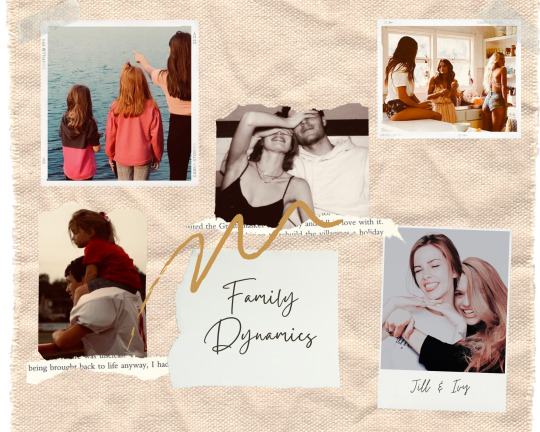
Growing up, Jill was a total daddy’s girl. And the Valentine girls had Matthew completely wrapped around their little fingers. He would go to the ends of the Earth if his girls asked him to. She wasn’t as close with her mother; the two of them had similar strong character, so they usually clashed, but their relationship was still strong. All of that was until the moment Jill decided to pursue human medicine instead of veterinary medicine, like she was supposed to. Her decision created a huge rift between them, and although they didn’t disown her and still paid for her education, her parents didn’t save their comments to themselves. Both of them, but especially her mother, made sure that she understood how disappointed they were in her. They thought she was throwing away her life, all they had built for her. Jill got used to those resentful comments and passive-aggressive remarks, but they still did their fair share of damage, and her relationship with her parents was never the same after that.
Jill is much closer with her older brother than with any of her sisters, because they share the most similarities, but the four of them are tight-knit. Lucas is ten years older than her, and the considerable age-gap caused their relationship to be as smooth as it could get between siblings. Since the moment she was born, Jill became Luke’s little princess, he spoils her immensely and he’s defensive and overprotective when it comes to her. In turn, Luke became Jill’s hero, and she looks up to him for absolutely everything. And when the time came, Luke was the one to really believe and support her, unlike their parents.
Her relationship with Katherine varies from time to time. Kat is eight years older than Jill, and acts as a protective and bossy older sister as much as she can. The age-gap is enough so they don’t exactly fight for possessions or games like a pair of sisters would. Though, much to Jill’s dismay, Katherine is almost an exact copy of their mother, so she clashes with her more than with the rest of her siblings. It also doesn’t help that Jill grew up being constantly compared to Katherine, so there’s a residual resentment underneath that make their relationship rocky from time to time. Still, the two love each other deeply and would do anything for one another.
With Ivy, the dynamic shifted, because she was no longer dealing with older siblings; with her, Jill became the older sister. she’s two years older than Ivy. She’s protective and defensive of her, but without being overbearing like their two older siblings would. Being closest in age, they shared most moments growing up and bonded over their similar experiences together. Between them, existed the usual fights for toys, games, clothes and make-up that didn’t exist with the other two, but also a better understanding of what the other was experiencing. Still, while Jill is a close copy of their older brother, Ivy resembles Katherine more, so they clash from time to time.

Jill grew up in a privileged home, as part of a wealthy family. Though, her parents didn’t want a nanny to raise their kids, so they got involved as much as they could and were really hands-on. They had a butler, Roman, that was just as involved as their parents, but never stepped in as a replacement for them. She grew up with three siblings, two older and one younger, in the family estate, in the outskirts of Manhattan.
Coming from a traditional family with old money, Jill’s upbringing was different from what anyone expected; it was a pretty strict environment. As per custom, at the age of six, each Valentine has to take a set of important decisions, established from generation to generation; they have to choose an artistic skill to develop, a music instrument, a language to study and a sport, so all of them would be educated in every area. Jill chose dancing, piano, French and tennis, respectively. And, coming from a family of veterinarians, at the age of ten each Valentine gets a pet, so they can learn to be responsible and mature from a young age; each of them are in charge of everything their pet might need, including food, exercise, medicines, etc. Jill’s first pet was a cat named Theo.
Even though she’s from a wealthy family, Jill was taught to do chores and earn everything by herself. She was taught to cook the basics, do laundry, sweep, vacuum, wash dishes, clean bathrooms, dust, mop, iron clothes, mow the lawn… And once she turned fifteen, she was also expected to work half-time two days a week at the Veterinary Hospital with her parents, to learn about hard work. She had a trust-fund, but she never used it because she only spent what she had truly earned.
Growing up, she also struggled with really connecting with people outside of her family. Because of her vibrant personality, Jill got along with everyone, but she only considered one of them her true friend, Hunter Griffin. Hunter and Jill became inseparable from the moment they met, when they were merely five years-old, and their friendship only grew stronger with time, and she was sure Hunter loved her for exactly who she was, that’s why it was easy to open up to him. Jill always hated how most of people either wanted her for her family’s fame or money, or expected her to be a clone of her older sister, so she learned to not get too attached to people, friendship-wise and relationship-wise.
All in all, it was a pretty strict and intense environment. It didn’t help that, in her eyes, her older sister, Katherine, was apparently perfect in every aspect, and Jill always felt like she was living in her sister’s shadow, being constantly compared to her. All of it combined only prompted Jill’s partying habit to break out, as a coping mechanism. And even if she partied up as a teenager, she was always the responsible one, never drinking nor doing drugs, but simply letting loose.

Even though Jill lived to her party girl reputation, she kept up her grades close to perfect, which was the main reason her parents could never ground her for going to any and every party and staying out all she wanted. She attended Léman Manhattan Preparatory School with perfect record. She kept up her GPA and was appointed Valedictorian and Prom Queen, just like the rest of her siblings and family members before them. As a teen socialite, she was constantly bothered by paparazzi and also quite under the spotlight, so every little thing she did ended up being public knowledge, to the point where she’s also been photographed for a few magazine issues. She was a debutante, like it was custom for everyone in her family, and has attended more balls, galas, reunions and charity events than any normal teenager. Though, even if she gained quite a reputation, in public events with her family she’s always been seen as polite, diplomatic, elegant, and downright charismatic, which earned the media’s favor.
Most of it continued all the way to college. She moved away from New York when she was accepted into Harvard; however, she wasn’t a known public figure in Boston, which was something she welcomed deeply, so she finally earned some peace and privacy. She toned down her party girl habits to only from time to time when she felt like it, and instead focused mainly on her studies. Jill quickly became the top student of her class and graduated with honors, part of it because it was something she was passionate about, and another part of it to prove her parents that this was the path for her.

From the moment she turned fifteen, her family set them up with one of her classmates, from another well-known family. His name was Augustus Danvers. The two of them got along great and even though they both tried to make it work, for their families’ sakes, they quickly discovered they didn’t have any actual romantic feelings for one another. Their first time was with each other, but not because there were feelings; it was more because they were used to each other and wanted to get over the curiosity. After that, they came to an agreement, to keep it an open relationship, where both of them could see other people and date whoever they wanted, but for family gatherings and social events, they pretended to be together. Even though they weren’t really together, they agreed to break-up, secretly, during winter break in their senior year, and later amicably broke-up in public after their prom dance.
It was Jill’s only ‘serious’ relationship. Given that she had learned to not get too attached to people, friendship-wise and relationship-wise because of her family name, she never got too close to anyone, and never felt the true want to commit to a single person. She had a long string of casual dates and hookups, but never an actual relationship. It also didn’t help that, from a young age, Jill was witness to Katherine’s devastating heartbreak after being left at the altar, and since that moment, Jill swore to never let that happen to herself. Though, she’s always honest with anyone she’s seeing about what she wants and what she doesn’t, because she would never get someone’s hopes up just to destroy them. She’s mature enough to know what to say to keep things honest and transparent, drama-free, and when to walk away when it’s not something that works for her or the other person.
Once she moved to Boston, she kept things short and casual with everyone. At Edenbrook, she pursued a friends-with-benefits, no-strings-attached kind of relationship with Bryce Lahela, and even went on a couple of casual dates with Rafael Aveiro. Though, Ethan was the game changer. She didn’t realize she was falling for him until it was too late and there was no going back.
Bonus:
A few of Jill’s magazine appearances

For @openheartfanfics Meet My MC Event ☺💕
Tags: @jamespotterthefirst, @takeharryandgo, @aestheticartsx, @choicesfanaf, @fireycookie, @liaromancewriter, @trappedinfanfiction, @tsrookie, @genevievemd, @lucy-268, @writinghereandthere, @queencarb, @gryffindordaughterofathena, @ohchoices, @anntoldst0ries, @bluebellot, @schnitzelbutterfingers, @mysticaurathings, @iemcpbchoices, @itsjustamesshonestly, @shanzay44, @lsvdw-blog, @heauxplesslydevoted, @starryeyedrookie, @casey-v, @mercury84choices, @chaoticchopshopheart, @quixoticdreamer16
20 notes
·
View notes
Note
Heyo! For the ask game:
- Like Lexi Two said, very sad! But you manage to channel a lot your feelings (positive and negative) to your art and music, so yay for coping mechanisms! These are also things that you had to develop, rather than doing it for fun, so external influences are pretty prominent.
- Super smart and precise. When you have an idea in your head, you take it and execute it, it seems you normally have a pretty clear vision of things before you carry them out.
- You don't talk about music taste as much, but I don't vibes of you like really hardcore rock? Maybe Beatles or Queen, but not screamer stuff. And I feel like you're pretty picky w/ musicals, just cuz you've got Ham and Heights (and Book of Mormon?) but I don't see you post too much about others.
I had more in depth stuff but I've forgotten😵💫 le whoops
- Yeah, you’re right, but it’s all right. I used to mainly draw for fun, but I found as things got harder to deal with, drawing sad and miserable stuff was very…cathartic, in a way. Still, I do enjoy the occasional fluff piece!
- Smart? Maybe. Dumbass energy? Absolutely. The reason why things seem so precise is because I have random ideas, write em down, and then manifest it into what I want through sheer force of will. (Just kidding! I actually have a lot of failed versions of things that the public never sees…)
- Ooh! The last one is where you’re a wee bit off. I’m a bit like Mrs. Hudson- you can catch me singing System of a Down or Slipknot while vacuuming or doing things. But! I do love Beatles and Queen and the like.
- Musicals! I actually like a lot of musicals, I’m just mostly in the fandom for Hamilton and ITH (because of Lin). My first major musical revelation was Moulin Rouge and I’ve never stopped loving it, but I also like Beetlejuice, Mean Girls, Book of Mormon, Les Mis, and Little Shop of Horrors. :)
-AE
5 notes
·
View notes
Text
(Disclaimer: this contains spoilers for the Fruits Basket and Fruits Basket: Another manga, as well as taking into consideration tidbits from Takaya’s twitter.)
So, okay, first of all we have to address the YMMV aspect: Some people don’t like this ship. As long as they’re respectful, I have no beef with that. I’m well aware that some people cannot/choose not to make the distinction between “real life” and “fiction”— I have the luxury of this choice, so some of the “problematic” ships/character aspects within Furuba don’t bother me (for the most part). It’s fiction, and I’m aware of this.
Again, some people cannot/do not make this distinction, and that’s none of my business because that’s their personal life. I’m aware that people dislike aspects of Akigure, and that’s fine.
Personally? I’ve been reading Furuba since like, basically the dawn of time. I was reading scans on, like, MSN groups. I remember a friend at church (of all places) telling me about the Akito reveal because I was behind on updates. It’s literally engrained upon my shipping heart at this point.
(Headcanons ahoy! Like literally, this is all headcanon/my perspective on the series as a whole. YMMV/YKINMK/Dead Dove, the whole works, if you know you know
YES I wrote it like it’s an actual research paper because I have No Chill At All, please forgive me. It’s long and pretty rambling.)
Addressing the first elephant in the room: Given my limited interactions with the fandom, my impression of Akigure from a generalized fan POV is that it’s pretty divisive. Every episode she comes up there are “I hate this kid” comments and I cry
Akito is a favorite of mine, and it’s impossible for anime-only’s to make a deep, informed call on her character. On the other hand, a lot of manga-readers dislike her too.
So, why am I talking about whether or not people like Akito as a character?
I’m of the opinion that it impacts people’s ability to view her character arc as one that deserves a happy ending. That she doesn’t deserve to have love, happiness, or forgiveness, all of which are given to her when she and Shigure finally end up together on equal footing. (Do I think the way it’s rushed in the original Furuba ending? Yeah, but hey. Sensei had like a huge ensemble cast to wrap ends on. Now there’s Furubana to look to and it’s just chef’s kiss.)
There’s a mental aspect in this, involving the dichotomy between “reality” and “fiction”.
There is absolutely zero argument that are a lot of things that Akito does that uh, listen, if it was IRL she’d be in jail! Jail for terror baby! Jail for life!
Fortunately, Fruits Basket is a work of fiction. These characters aren’t real, they’re idealized brushstrokes of human nature created to move a plot and a message along.
That’s why Akito and Shigure work as a couple and as characters:
They’re both incredibly deep characters that get passed off as one-dimensional by a lot of people (and the original anime, woof). Some of it is again, because anime-only fans just don’t have the whole story, since Akito’s arc is one that builds gradually until it hits a point where all hell breaks loose, which we are a ways away from.
So what’s the message that their relationship and characters are supposed to pass on?
Well, it breaks down into two categories: world building and thematic arcs. The latter is more important and what I’ll be focusing on, while the former is just a little spice that I, personally enjoy, and won’t really talk about in depth. (It’s that the magical realism in Furuba sets up the idea of soulmates, it’s just…. Something I enjoy and it’s really heacanony, so I can’t really justify spending more words on it!)
When discussing Fruits Baskets in any capacity, I feel like we must first keep in mind the thematic “lessons” of the series:
There is an inherent loneliness in living as a human being, since loss, grief, and hurt are indelible parts of the human experience, and learning to cope with these feelings in a compassionate manner is a life-long lesson
People react differently to the loneliness of existence, and their reactions are based upon their personalities, their upbringings, and their own choices
Everyone is capable of change and learning, if they choose to do so, however:
Personal agency is taught, but in the vacuum of positive reinforcement, the ability of a person to choose to be compassionate is stifled or outright inaccessible
Therefore, if you are not taught to deal with your grief and existence outside of others, your ability to connect may become warped, manipulative, or abusive, and this is not the fault of the child but instead the parental figure
Eventually, you will be aware of your actions, and then it is your burden to choose—some people do not take this choice (the head maid, Ren, Kyo’s bio dad, Rin’s parents, Sawa’s mother in Furubana)
Abuse has long lasting effects on the psyche and can be physical, emotional, and/or mental in nature and must be dealt with in order to grow as a person
“Dealt with” does not mean that it goes away, but that it is acknowledged and given a positive outlet (Yuki’s garden, Aaya’s shop, Rin’s art, Momiji’s violin playing)
Forgiveness is not linear
Forgiving yourself is a long and arduous process, and happens independent of other people’s forgiveness
This is really brought to the forefront in Fruits Basket: Another, when Shiki talks about how his mother interacts with the rest of the Sohma family. It’s shown she’s done what she can to make amends, but recognizes that while she can individually hold relationships with certain family members, as a whole, it's best if she allows them to be away from her.
This is a whole tangent on its own, but there’s a certain blanket of casual forgiveness given to Akito by the entirety of the shown Zodiac in Furubana, in that they trust that she’s raised a kind and thoughtful son and allow him the grace of his own family.
Again, in Takaya’s tweets post-series that acknowledges that Akito’s friends with Uo-chan, despite her relationship with Kureno (and it shows a depth of awareness on Kureno’s part that he stays away
People flourish in environments where love and positive reinforcement is given freely, even when people are in the wrong
This doesn’t mean that no one is ever scolded: see Komaki and Kakeru, Kisa and Hiro, Hatori chews out Shigure all the time, but never ceases being his confidant
So okay, that’s A Lot. But every single character in Furuba follows these themes in their own manner, because the series is about healing and learning how to heal from abuse, neglect, and isolation. Someone’s gonna have to be doing it. Point blank, the end, to tell a story there must be conflict, and boy howdy, there’s a lot of conflict in Furuba. Every personal thematic arc in the series ends up tying into a romantic one, because Furuba is a romcom drama.
There’s a loop that goes “personal betterment”->”crush”/”friendship”->”conflict”->”personal growth”/”relationship growth” in the series for every character. That’s the bread and butter of Furuba.
But anyway. To the question:
I love them because they work, they’re both their own people with their own narrative focuses, motivations, conflicts, and flaws. Both Shigure and Akito are believable in their own right in the context of Furuba, and I think Takaya did wonderfully in crafting a story where their personalities mesh well and give each other reasons to better themselves.
To talk about them together, you have to talk about them separately.
I’m gonna start with Shigure because, truthfully?
I just want to lament about how often he’s simply passed off as either comic relief or absolute trash. He’s so underestimated!
“He’s a joke of a grown man… He is reliable and I trust him.” (Another, v. 3)
He’s incredibly intelligent when it comes to interpersonal relationships, which is why he’s able to do what he does. He’s also incredibly kind—no one made him take in Yuki or Kyo or Tohru. He could have just went “ah, I’d prefer not to” and moved on. But he didn’t, made up some bullshit so Haru would feel like taking in Yuki was a transaction, and let me just tell you, I am the same age as Shigure and if you gave ME three teenagers to be the guardian of?! It would be a full on disaster.
He’s actually incredibly trustworthy (if he wants to be), insightful, and a genuinely good guardian despite his jokes and wisecracking.
He forced Kyo to go back to school, knowing full well it would be good for him. He lets a whole host of children run rampant through his home. Kids who actually enjoy his presence. He’s shown as having a good familial relationship with Rin (who tries to warp that for her own means), Kisa, Haru, and Momiji. His advice to Tohru is genuine, insightful, and ridiculously helpful.
Shigure is good with people. He gets up at the crack of dawn to drive Shiki to see Sawa in Furubana. He’s who Mutsuki and Hajime immediately go “holy shit you need to do something about this” to when they find out Shiki’s getting nasty notes about Akito. He’s who Shiki goes to when Sawa fell down the stairs as a child. As much as Shiki and the others make fun of Shigure, he’s obviously someone who’s trustworthy. And that’s not some new development, he’s always been trustworthy in regards to those he loves. No one asked him to show up to Tohru’s teacher conference, he volunteered. Like this dude loves people, he’s the dog spirit after all, and rightly so.
Does he have his own motivations? Of course! But so does everyone else in Furuba. He’s a complex character, man!
He laughs and jokes a lot because he’s projecting this image of a laid back, doofus. When you think about who he’s friends with, the whole middling goofball act makes a lot of sense. Just like some of Ayame’s over the top behavior is a defense mechanism, I believe that Shigure casts himself as a generally unappealing man to keep himself safe from advances when he was in school, but also to temper the wildly unequal personalities of his other two friends. He’s the sort of person who would just go “eh, whatever makes it easy”, and that’s just how he is.
He doesn’t mean the creepy school girl thing, it’s a bit and I think the only people who don’t realize he’s running a bit are Yuki, Kyo, and Tohru who are absolutely too stupid to realize he’s playing them for reactions. He thinks it’s funny.
Anyway:
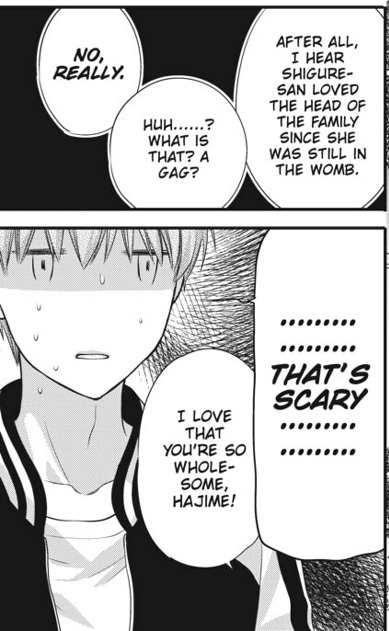
When the older Zodiac had the dream of Shigure, Shigure is the only one who made the active choice to seek out that feeling. His soul was touched, and he decided that he wanted that and only that. This doesn’t necessarily mean he went full Jacob from Breaking Dawn, but it does mean he acknowledged there was a bond, and he wanted it.
When you get into the technicalities of the curse, it’s mentioned that their Zodiac spirits influence how they interact with Akito, and that going against her can cause physical and emotional pain. Yuki cries when meeting her, and it’s mentioned that that’s just the normal reaction for the Zodiacs.
It’s hard to say how much of their early interactions are influenced by the curse, but it’s obvious that Shigure has genuine fondness for her. She wasn’t always absolutely broken, as shown in Yuki’s backstory, and was a precocious child, one who sought affection openly.
Shigure has an indulgent personality, and is shown to love being adored. Guess who loves him! Akito! Guess who wants lots and lots of affection! Akito!
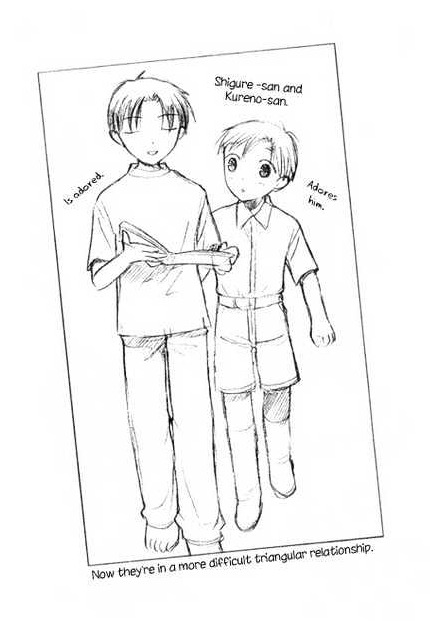
Their personalities are very well matched as they get older: They’re both intelligent and coy. They both have fairly sharp tongues when needed, and have no qualms about doing whatever it takes to get what they want.
Shigure wants Akito to be independent from the curse. He’s made it clear to her he doesn’t want to be her father, he doesn’t want to be her friend, he wants to be her lover. Those are boundaries that Akito’s never been given before, and his frankness with her and his jealousy with Kureno is something she agonizes over, simply because she’s never been given any sort of serious interpersonal boundaries, or repercussions for her actions. He’s always kept himself separate from her, because of those boundaries, even when they were children.
That’s important. It opens the door to the idea that her actions have consequences, and is a persistent nagging in the back of her mind.
“Even though you hadn’t realized it, I was waiting for that day.” (ch 101)
For the bulk of the series, the only person who sees Akito as a person separate from the curse, and sees a future where she can grow is Akito. He has an extraordinary amount of patience for her, and forgives her for a lot.
There are only two incidents that Shigure cannot forgive: Her sleeping with Kureno, and at the very end of the series, I’m of the full opinion that if Akito had pushed Tohru off the cliff, Shigure would have been done with her. Look at that expression, that is the look of someone who is toeing the line of throwing away all his hopes and dreams. If she really had pushed Tohru, I just...... The series would have taken a much darker tone.
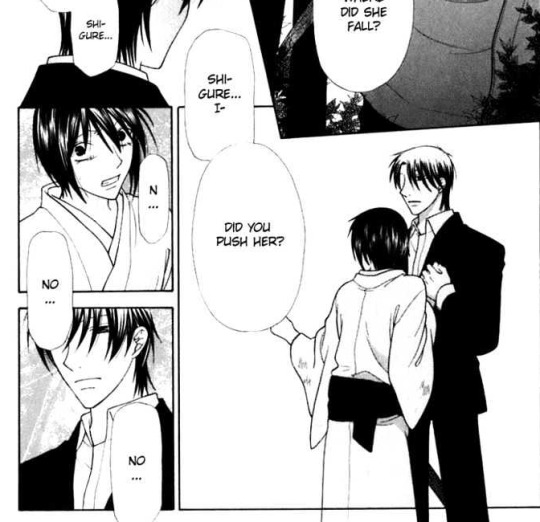
OKAY that’s enough about our favorite terrible author! (Okay, an aside, Shigure, please share your work ethic, you goof off so much but you’ve published so many things…how…)
ONTO AKITO!
“I’ve finally realized… she hated her own shallowness all this time, from the very start.” // “It’s frightening because you have no choices.” (ch 121)
A lot of people dislike Akito because she, for the bulk of the manga, is violent, manipulative and just downright unpleasant. And that’s fine, but it’s not the point of her arc or the themes of the manga. (It is, however, the point of Rin’s: you don’t have to forgive everyone.)
She’s not the only violent person in the series. If we as readers can forgive Uo-chan and Kyoko, or even Hana-chan for her moment of violence, why can we not extend the same grace to Akito?
Violence is often shown as a knee-jerk reaction to fear and sadness: Kyoko, Uo, Hana, Kyo, Rin, and Akito all react violently to negative situations and feelings. Even Kisa reacts violently when she’s at her worst, biting both Haru and Tohru when she’s in her tiger form, which is shown to actually cause pain like a real tiger would. (It’s played for laughs, but has anyone been bitten for realsies by a house cat? That hurts! How much more would a house-cat sized tiger hurt!!!)
Out of all of them, Hanajima and Kisa are the only characters to show immediate remorse, because they have what the others don’t: A positive support system. Once positive role models and support systems are in place, all of the others begin to learn how to react differently and ease out of the knee-jerk reactions that were ingrained in them.
It’s made explicit in the manga that you have to be taught how to react positively, you have to learn and choose to be good, to be friendly, to love yourself outside of others’ perceptions of yourself. Look at Yuki’s arc. Look at Uo-chan’s. Kyoko’s.
Yuki sums it up nicely in the last chapter of the manga, where he tells Tohru that she taught the Zodiac how to become human. She allows them to grow into people who can make the choice to be loving, compassionate individuals.
Just because Akito doesn’t interact positively with Tohru for the bulk of the manga, it doesn’t make it any less true:
Akito is kept in a juvenile state of being: No one teaches her to suck it up, that the world exists outside of herself, that other people are people and not things. In fact, she’s actively encouraged to act the way she does. She’s incredibly broken, between the maids of the Sohma estate just… allowing her to do whatever the fuck she wants and her absolutely jacked up relationship with Ren and Akira. She has no moral compass at all. No one bothers to teach her that her actions have serious consequences.
She knows, in a roundabout way that hey, these people don’t like me. There’s a serious mental dissonance between what she latently knows—these are all people with no connection to her other than the bond of the curse. This is why Tohru is able to break through to her at the climax of the manga:
She knows she’s wrong, but no one has ever told her she’s wrong but understood why she’s doing it. Akito just didn’t have the words to explain herself. What do children do when they cannot communicate? They lash out. Kids will bite, scratch, yell, kick, fall to the floor and have screaming tantrums out of frustration. Eventually, most kids learn that there are other ways to express frustration, and move along. (Not all, though, but most.)
Akito was taught that this is acceptable, allowable, and is her right as god. She is actively broken and kept that way through the neglect of the Sohma family maids, Ren’s abuse, and how Akira framed her role in the Zodiac.
I can go on and on and on and on why the way Akito was treated for her role in the Zodiac by her parents and the rest of the Sohma estate was just awful. I hate it, it’s terrible, she never had a chance to learn and grow and be the genuinely thoughtful woman we know she grows into.
She doesn’t force her path of forgiveness onto others and is fully cognizant of what she did, the repercussions of her actions, and lives her entire life after the curse breaks trying to right what she did wrong.
“Even if she gets hurt, she says she deserves it. She tells me not to let it bother me, but… I’ve always, always loved her so much.” (Another, ch. 13)
Tohru opens the door for Akito. She extends her hand, offers her friendship despite having seen the absolute worst of Akito. She tells Akito that everyone is lonely, everyone wants bonds, and acknowledges Akito’s worst fears, that Akito herself is selfish and dirty for wanting something assured and unending because she, Tohru, herself is dirty and selfish. Tohru knows what Akito has done, knows she’s injured some of her beloved friends, had plans to lock up Kyo, hurt Hatori.
Tohru still forgives her. One of Tohru’s striking traits in the manga is that she is suffering, every day, she struggles with the grief of losing her mother and the fear of being alone in the world. Through nothing but her own empathy and realization that loneliness is universal, she’s able to forgive people. She forgives Akito and cares for her, and through Tohru, Akito is introduced to the realization that she’s been wrong and that maybe, she shouldn’t be forgiven.
Shigure also forgives her, and this is the crux of their ship.
To me, that itself is wildly important.
They’ve always circled around each other, and Shigure has always been waiting for Akito to be able to come to him again, in full control of her life and choices. He wants Akito the woman, not Akito the god.
He’s been waiting for the day Akito can meet him as an equal. Akito wants it too, and has wanted him to turn and see her for a very very long time. But she’s been terrified, the entire time, that when he does see her as herself, Shigure won’t like what he sees, and will leave. She’s aware of what she’s done post-curse, she’s aware of the impacts it will have on the former Zodiac members, and she’s aware that once the “bonds” of god and the animals is gone, there may not be anyone left for her.
Neither of them are under any illusions at the end of the series: Akito knows she has to atone for what she did, Shigure knows she has to learn to grow into a person who can function alone. They both know that there are people who are against them changing the oppressive structure of the Sohma family.
Neither of them care. There are things that they want, together, and it’s enough. There’s a whole new world for them to explore and learn about. And in Furubana, this is shown to be a lifelong effort on their parts:
“She said after meeting me, she learned so many things for the first time. She smiled happily as she said it.” (Another, #13)
To close, I’d like to take a moment to talk about the curse and Shigure, and how he set things in motion.
Without Shigure, the curse would have devolved on its own, yes, but the circumstances would not have allowed for the freedom the Zodiac had at the end of the manga. It would not have ended with Akito being able to learn and live freely. Allowing Tohru into the Sohma family cracked open a door to compassion and kindness none of them had ever experienced before, because the Sohma family seems to exist in a vacuum of stability and love.
It wasn’t that Shigure knew instantly that Tohru was kind and loving and thoughtful, if anything, his read on her was “completely normal, albeit strange, teenage girl who obviously has a rough life”. But she was normal, she was from outside the Sohmas, and he knew that was enough. No one in the family was stepping up to change the status quo and how stifling and abusive it was, so he did it himself.
He did it because he loved Akito.
Not because he felt bad for himself, or Hatori, or any of the others, but merely because he loved her to the point of manipulation. It backfired in his face, because he got a big ol’ dose of “loving and respecting” juice from Tohru, but he still got the end he wanted.
What I mean to say is best summarized in chapter 123:
“It would be nice to live in a kind world, without any troubles, without any fear, without hurting anybody, without ever being hurt, only doing the right thing. I wish I could reach this kind world by the shortest path possible. … “That’s wrong”, or “that’s stupid”: If it’s someone else’s life it’s so easy to make such irresponsible comments. ...It would be great, but it doesn’t exist. … Little by little, walking one step at a time, is all you can do.”
We get to experience the roughest part of the path with Akito and Shigure, we got to watch them be terrible people who were lonely and in want of love struggle and learn how to get up and move on.
They tease each other, Shigure is thoughtful of the distinction between “the person Akito was raised to be” and “the person who Akito is”. He’s seen her at her messiest, and she’s seen him at his most jealous. They still chose each other, despite the hurt they caused each other, and others. They make up for it, reflect, and live a life that demonstrates that they have learned. They have friends who are thoughtful and loving and would not hesitate to drop everything and help them, lend an ear when they’re frustrated, help them not to make the same mistakes.
And then we get to see them be wonderful, kind, thoughtful, loving parents in Furubana.
We got to see their adorable, kind, compassionate child be friends with the children of the people Akito hurt, because everyone in the former Zodiac’s family collectively decided “never again, no”.
Their child adores them. Shiki in Furubana #13 radiates love for Akito and Shigure the same way Mutsuki and Hajime do.
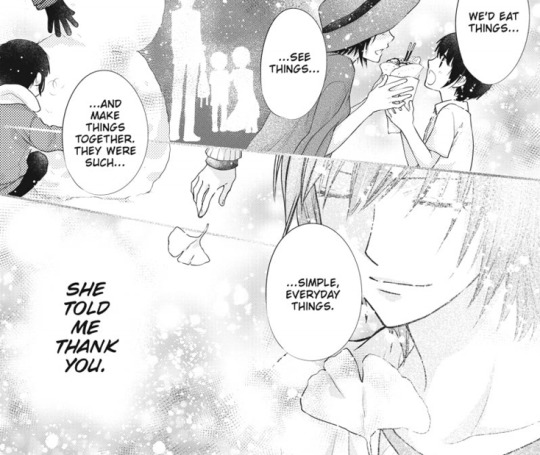
They are genuinely good parents, even when they tease Shiki, and I think that is testament for how good they are for each other and how much they’ve changed as adults.
I think that’s enough of a reason to ship them, don’t you?
#Mitkun writes stuff#fruits basket manga spoilers#fruits basket another#fruits basket spoilers#akigure#fruits basket akito#fruits basket shigure
66 notes
·
View notes
Note
[1/2] I'm planning to write a bakudeku fic set in the canon and I plan to develop their romantic relationship in the most likely and unforced way possible, so I wanted to ask you how you would develop it and if you have any advice to give me. For example what should I avoid? And how do you think they can develop romantic feelings for each other? And what would be canonically plausible for you? Sorry if I +
[2/2] Sorry if I disturb you but I love your metas and you have an objective way of seeing the various characters and the various relationships so I think your opinion would really help me! Of course answer me only if you feel like it and it's not too much trouble for you! (If someone else wants to reply in the comments I'm more than happy to read them!)
I’m not much of a romance writer myself, and I tend to enjoy more offbeat stories than straight-up tooth-rotting fluff. So remember, something that I may find nice or realistic could be a total turn-off for others.
I think for canon bkdk, the key is to build up the friendship properly first. You need to figure out where you want to set your story in canon? If you are setting it now - end of first year, beginning of second year - I think it’s more tricky to develop a realistic romance than let’s say setting it at the end of third-year, beginning of pro-Hero time where you can conveniently do a time-skip and pretend that they are already good friends and worked out all their problems.
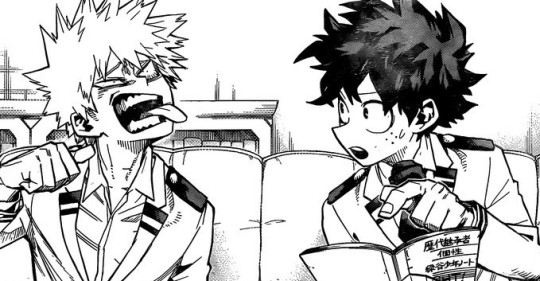
If you are talking current relationship, BKDK is more rivals with grudging respect, with a ton of unresolved history, who keep each other at arms’ lengths, until they inevitably collide and blow up in some spectacular fashion. They can talk about OFA or cooperate in a battle, but they still move mostly in separate social orbits and don’t really discuss personal things except when they are yelling and fighting.
So the first thing is to fix their friendship. This will require personal growth on both sides, though admittedly mostly on the angry gremlin’s side. He’ll need to become more emotionally honest (even with himself), be able to take risks at being vulnerable, learn to emote through other ways than anger and continue to become more outward looking. It would help to develop more empathy so he can learn to see things from Deku’s point of view.
Here you could try to use as a shortcut a catalyst like a bodyswap, soulbond or truth-telling quirk (anything that can provide a window inside each other’s head a bit), or just meeting a person who could be a stand-in for Deku (like a quirkless kid who’s being bullied) so he can look at it as an outsider.
Bakugou needs to get to the place where he both sees how fucked-up his treatment of Deku was, and wants to do something about it. BKDK has a ton of baggage, which makes writing a healthy romance tricky (unless you want to write unhealthy coping mechanism romance, which has its own charm), so I think it’s good if they somehow clear the air in this “growing friendship” stage. An apology from Bakugou and Deku expressing his feelings would be good, so they’ll have sort of a clean start. Obviously it will never be in a vacuum totally, but they should have a shift here where they put the past behind them (it can rear up its ugly head sometimes though, that’s good tension, but sparingly).
Then continue to build intimacy - in whatever way. My preferred drug is mutual emotional support (and the keyword here is mutual!), but revisiting childhood memories (the good ones), developing their own little communication where they understand each other without words or developing a routine - e.g. training together, or make them sit together even after AM is gone in the breakroom, drinking tea - whatever you like. They should become each other’s best champions.
One of my favourite tropes are BKDK deciding to date for real and them realizing that it’s the same stuff they’d been doing for months/years. Like eating out, geeking out about hero stuff - this sort of stuff. And also how effortlessly they are able to handle each other once they clear the air, like Deku becomes an expert of diffusing Bakugou’s anger without giving an inch, and Bakugou can snap Deku out of whatever spiral he gets into.
I guess there’d have to be an AHA moment, where one or both realizes a sexual attraction. There is no need to overdo this bit, but like there can be subtle hints here or there before. Like establishing how a touch feels, borrowing clothes from each other, checking each other out. Here, I think some emotional constipation / overanalysis / hiding stuff would not be out of character. (I hate love triangles, so I wouldn’t do that).
Then there should be some sort of breakthrough - a moment that lowers their walls - this could be due to a quirk, drink, physical danger, injury etc that could push out a confession. Or it can happen on a random Tuesday night when one side just decides that they are sick of hiding. Both can work well.
What I personally don’t like in some BKDK fics (but then again, it’s your story):
- when their relationship doesn’t feel equal - dainty Deku heart-eyeing strong hero Bakugou or strong Deku fixing poor broken Bakugou.
- when either of them is given God-mode and can never be wrong - let them both screw up, let them both shine
- dragging the childhood bullying into the romance endlessly or pretending it never existed - neither is good. I like when the fic deals with the baggage.
- when the romance turns them into pink, fluffy bunnies. Remember that you build on an existing canon dynamics and their friendship should be the foundation of the romance. So the romance shouldn’t erase their personalities - Bakugou should stay rough around the edges, Deku should stay himself, they both are hyper-focused on their hero goals, etc. These should remain there in essence.
There is no need to drag down Kirishima or Todoroki to develop BKDK. Canon friendships can and should remain.
These are my main no-no’s.
But anyone having an opinion, please chime in.
In the end, experiment with whatever feels natural to you - the most important thing is to have fun and be excited about your own project.
#bnha#bakudeku#bakugou katsuki#midoriya izuku#but this is just my personal opinion / taste#write what you feel like
60 notes
·
View notes
Text

18. What is a line/scene you’re really proud of? Give us the DVD commentary for that scene.
Oh man, I love this ask. Let’s talk about Chapter 13 of my Buzzfeed fic with the title that’s too long (which you can find here: https://archiveofourown.org/works/27692356/chapters/68739534).
I had like five paragraphs here talking about the LGBT community and the Rocky Horror community and how much I love being in them both, but I will literally never shut up if I start talking about that so instead I’m just gonna talk about one detail I wove in here that I felt very clever writing, but will remain invisible unless I point it out.
Earlier in the chapter, Steve is coming to grips with one of the more, ahem, physical realities of being queer just before they’re about to head over to the theater.
“Ready?” said Tony.
“Hang on,” said Steve as he took off his jacket to drape over his arm so it covered his crotch.
Steve is literally covering himself up with a costume and answering in the negative, he’s not ready to come to grips with being queer yet.
Now let’s jump ahead to the end of the chapter, after Steve’s conversation with Frank.
“Ready?” [Tony] asked.
“Think so,” said Steve as they walked out of the theater.
Steve is ready now. And what’s more, they walk together, which is a recurring motif in this fic for something Steve and Tony do when they get closer together (and conversely, they walk off separately, or are mixed between sitting and standing when they are not on the same page (Look man, I’ve got an MA in English and a job in tech. If I don’t put this stuff in fanfiction I start putting it in code, which nobody wants to read in their HTML)).
19. Who is the easiest/hardest character for you to write about? Why?
I know I’m on a Stony kick right now but I actually write Doom Patrol and MCU fanfics both fairly equally, so I’ll answer this for both of them.
Easiest are Tony Stark and Cliff Steele. Tony because he never shuts up and my ideal writing exercise is two formless entities making quips at each other in a boundless eternal vacuum. He’s also got a similar background to my own, so it’s easy to find things to draw on with him to flesh out his character. He’s a funny, chaotic, good-hearted man who tries to bamboozle anyone who tries to get to know him because he’s secretly afraid of being judged and found wanting, and that’s just plain fun and interesting to write. Cliff is also a quippy motherfucker, and I just love his attitude of “What the f-- ok, more weird shit. Just gonna roll with it, again.” He’s also got so much dad energy that he doesn’t know what to do with, and watching him sublimate it into taking care of his teammates, particularly Jane, warms the cockles of my heart. And realizing you were someone different from who you are now, accepting it, and committing to making better choices for yourself and the people around you, that’s some heady character stuff for the both of them. Hardest to write are Thor and Crazy Jane. Thor because even though the man has three movies starring him and several team up movies, his personality didn’t really develop much till Ragnarok IMO, and you’ve also got to figure out how to handle the fat-shaming bullshit that happened in Endgame. He’s also just got a weird personality mix - ancient and wise, but also joyful and sweet. When you’re thousands of years old, what do you even see in people who die before they’re 100? And then on top of that he’s an alien, which is its own bag of beans to sift through. Jane’s difficulties are similar, in that she’s got a life experience so alien it’s hard to step into her shoes. In her case, it’s the most horrific backstory in the history of backstories, plus a coping mechanism that’s deliberately difficult to understand (and to handle sensitively, since disassociative personality disorder is real and not much like what Jane’s going through, which I headcanon as a unique disorder induced half by her trauma and half by whatever magic gave her her powers). And it’s also hard to know who’s talking, and how she’d react to what’s going on around her. When would Jane take the reins, and when would someone else? And who? How do you build relationships with people when you’re multiple people yourself? Very complicated and difficult to write well.
1 note
·
View note
Text
Jessica Walter
I’m sorry for all the Jessica Walter spam. I’ll stop now. I do, however, have some thoughts—because she really was more than a gifset to me.
Anyway, not to get too mushy, but discovering Jessica’s work as Malory and Lucille—two controlling, manipulative, bigoted mothers—made an impression in my mind that while these opinions have unfortunate real-world consequences, they can be laughed at in a vacuum, ridiculed with humor to turn them into outrageous and senseless sentiments.
And learning early on that there was a way to laugh at such a parent proved to be an important lesson. I’m not sure if I’m just making a mountain out of a molehill, but I really feel like that was significant to me. I could turn a controlling and bigoted parent into something funny, even just for a moment, even just for a laugh or two before the reality of how awful that is sunk in. Sometimes we need to laugh at our obstacles in order to keep from succumbing to them. And seeing these characters presented as pathetically funny for years of my life (I have seen both Archer and Arrested Development too many times in the last five or six years lmfao) was… Again, I could be exaggerating, but I really think it was important in teaching me how to laugh at it all. It didn’t fix everything, but at least I could see some humor in how terrible some opinions I’ve heard over the years are.
To everyone else, she may have just been a funny set of gifs. But for me, she was a coping mechanism and a light in times that got progressively darker.
I will miss her always, and her words—both those of her characters and those of her real persona, one of the sweetest, humblest famous actors in existence, as proven by interviews with her—will remain singed indelibly in my brain.
It’s one death, Michael—
How much could it hurt? ❤️
1 note
·
View note
Text
Catra vs Cassandra
Oh wow, so I knew something very specific made me feel especially satisfied after I had finally watched She-Ra and the Princesses of Power. And what I mean is writing and characterization
Cassandra from Tangled the Series?
Nice, complex character with shades of loneliness and ambition. Daddy issues, abandonment issues. Friend of the main character and member of the gang. Likes fighting and being a leader. Goes bad because... everyone has a destiny, she wants to do more and something mysterious was revealed to her. Which sounds interesting. But suddenly, in the final product of S3, it’s just because... mommy chose me over you and the demon girl told me I should throw a tantrum and kill you!
Catra?
Same, not really mean but ambitious in hardcore environment, with past of abuse and mummy issues. Friend to the main character and “second best” - except Catra seems to be aware in what environment she lives in and rightfully blames Adora for “leaving her” (or rather... being naive all these years... like the Horde wants conquest at all cost obviously, to finally rule the planet and their mentor and mother was Shadow Weaver.lol) Conditioning is one thing and worked on Adora but not Catra so she knew what they were getting into. Which is why she starts off as a villain but conflicted because of her friendship with Adora, she does not want to abandon her whole life just because Adora had a sudden revelation about the Horde, besides Catra hopes she’ll come back eventually. Fine by me. Still complex and if that’s not enough over the course of all seasons we see her fall down and down further into villainy, sometimes because it makes sense and they’re enemies now, sometimes because she’s emotionally broken and choosing the wrong coping mechanism/escape (the whole risk destroying the world just to prove Adora wrong, they choose you over me after MULTIPLE shocking examples of this in plot, sucking up to Prime at first). So yeah, big stuff. Bad stuff similar to Cassandra’s actions in Season 3 but those things don’t exist in a vacuum and we have a perfect development for them (also Catra’s allegiance... well it speaks for itself). That’s delicious writing seriously and too hard to summarize in a simple paragraph. Also, with Catra we have Entrapta and Scorpia (also Hordak) to interact with and show depth and when she is jealous and hurt and ambitious and mean and all that stuff. With Cassandra... after she switches sides there is nothing, just an evil demon that she trusts completely and then antagonizes her own father that she loves for no good reason “just because she angry and evil now” which is character assassination tbh.
Also, funnily enough, the critical point for both of those characters is (or would be? if done right) when they meet and interact with the villain of the show. Horde Prime for Catra and Zhan Tiri for Cass. Only for Catra the writing is top notch and she meets with Prime’s contempt for all imperfection, painful emotions and individuality overall, not to mention ambition. She is already aware she doesn’t really want to be like this and Prime only made it more clear to her, hence her turn from villainy to good guy feels complete in the end. While for Cassandra her turn to villainy is... a huge disservice and destruction of her character that I considered believable and interesting. The more she interacts with Zhan Tiri during season 3 the more apparent it becomes how stupidly written she is. Power because power it belongs to her for what purpose nobody knows and evil smirk because she jealous. Awful. Which is sad because I really wanted to see the opposite of Catra - a mainstay good guy turning bad bad guy for good, complex reasons. While Catra is brilliantly written and it’s delicious to watch it all come into fruition, she is still kind of basic “the villain you know and have feelings for gets redeemed” while the opposite representation is pretty rare - when they break your hurt after a long journey of bonding (interesting, complex things involved) and they’re NOT doing it for simple emotional reason, due to outside influence, nor their own stupidity. That’s what could have been with Cass in Tangled, you know...
but well, at least I have Catra, she was cool!
5 notes
·
View notes
Text
Misc. Luigi rambles (1 of ?): mostly LM1 edition
Luigi’s Mansion 3 is a great game that I thoroughly enjoyed, in large part thanks to the character animation on Luigi doing a fantastic job of getting across how scared he is all the time. That’s the main draw of a Luigi’s Mansion game, after all, right? (…No? Just me? I hope it’s not just me.)
Playing the game rekindled some of my Luigi Feelings from back in 2013, to the point that I decided to get some of those thoughts down in words now that I have a tumblr that exists for rambles like this. Said thoughts are actually mostly about Luigi’s Mansion 1 and are things I kept thinking about while eagerly waiting for the second game to come out. There’s also just some overthinking of Mario canon in general.
The deep backstory
So Mario is your typical perfect invincible hero who’s always eager for adventure and knows he can save the day, while Luigi is easily scared and lacks confidence and is rather emotionally dependent on Mario. They’re twins, but Mario is emphatically the “big brother” and Luigi the “little brother”, despite the fact that Luigi is physically taller, and also that he’s physically stronger than Mario in a lot of regards. He can jump higher, to name one example, and yet Mario’s always the one who’s famed for his jumping, as seen in the kinds of games where characters talk about this sort of thing, with nobody ever mentioning that actually Luigi’s an even better jumper than Mario, not even Luigi himself if he’s there.
This general gist of the bros’ contrasting personalities in spite of their relative physical ability actually happens to be perfectly set up by their backstory in Yoshi’s Island. In that game, they’re newborn babies (or as “newborn” as you can get when it happens via stork), but they’re evidently already self-aware to some degree based on the stuff Baby Mario is capable of, which I guess is just how babies work in this universe. And the game features Baby Mario going on an epic adventure with Yoshis to rescue his brother, while Baby Luigi is kidnapped and helpless to save himself, yet apparently has some kind of twin telepathy that lets him know his brother is coming to save him. So it’s only natural that Mario then grows up to be the heroic adventurous brother and Luigi the scared dependent brother, regardless of which of them is physically more capable. It makes an amazing amount of coherent character-writing sense as a backstory considering that this is, you know, Mario games.
(Plus, there’s also a Yoshi’s Island sequel on the DS, which, as far as I’m aware, features other babies the Yoshis can carry along with Baby Mario such as Baby Peach and Baby Wario… but Baby Luigi is still the damsel in distress who needs saving. It’s like the developers of that game knew they needed to keep Baby Luigi kidnapped and helpless because if he’d also got to have adventures with Yoshis as a baby then he would have gained confidence in himself after all, and clearly they couldn’t risk compromising the entire Mario canon like that.)
As far as I know, Luigi having an irrational fear of ghosts in particular doesn’t seem to be set up anywhere, alas. That’s probably just down to what I’ve noticed seems to be something of a Japanese writing trope to just give a character a deathly fear of ghosts, even though it usually doesn’t make any rational kind of sense to be so afraid of ghosts in particular (nor in Luigi’s case when there’s plenty of other types of dangerous beings in his world), simply as a shorthand to show that they’re a wuss. Which generally tends in the more complex cases to be rather disappointing lazy writing, but I don’t mind in this case because, A, it’s the Mario canon, it was never going to be that thought-out, and B, it means we get to have the Luigi’s Mansion games in which Luigi is constantly terrified throughout, and that’s obviously a good thing.
Humming
My favourite thing about the first Luigi’s Mansion game, something that it has going for it over the others even though the later two games are far better both in terms of gameplay and character animation on Luigi, is Luigi’s humming. Whenever Luigi is in a dark room that might have ghosts in and is not actively using his vacuum, he is constantly humming the same tune over and over. The best part of this is the three different humming tracks that the game uses depending on Luigi’s health, which get increasingly more desperate and terrified-sounding the more hurt he is. (Turns out Charles Martinet isn’t just here to do goofy Italian voices – he’s actually a really fantastic voice actor.) The lower-health ones especially really give the sense that Luigi isn’t humming this tune just because he feels like it, but rather because he’s desperately trying to keep himself going despite every instinct telling him to run away and never come here again. He does not stop humming, even though at lowest health he sounds so exhausted that he can barely manage to hum at all – yet he Just. Keeps. Forcing himself to hum that next note anyway no matter how brokenly off-key it is. It’s like he’s clinging to that as something to focus on and distract himself with, because without it he knows he’ll just fall apart. And he cannot afford to fall apart no matter what, not when he’s the only one who can save his big bro.
I say this is the one thing in the first game I like more than the second or third, but I’m not complaining that the second or third games don’t have this, because that kind of desperate constant survival-mantra humming wouldn’t make narrative sense in them. (Luigi does sometimes nervously hum the BGM in LM2, but only occasionally and only for short bursts, without different versions of it for different levels of health, so it doesn’t have nearly the same effect.) See, in the second and third games, Luigi’s done this before. He’s still scared, but beneath that, he knows that he’s capable of doing it again. As such, he doesn’t need such a desperate coping mechanism to keep himself going out of a fear that without it he’ll never make it to the end.
The tune that Luigi hums throughout the game is what I consider to simply be the Mansion’s theme (though I don’t know whether it’s officially called that or not). The mansion theme happens to be quite similar to E. Gadd’s theme, sharing a decent chunk of melody with it, to the point that I’ve seen multiple people not even realise they’re two different pieces and mistake one for the other. My headcanon for the similarity is this: E. Gadd’s theme was playing in-universe in some form the first time Luigi talked to him in his lab, to the point that it was stuck in Luigi’s head when he went back into the mansion. (This is very plausible, because E. Gadd’s theme explicitly does exist in-universe in the form of the GameBoy Horror ringtone.) So Luigi started humming it to himself to try and take his mind off his fear… except he only remembered some of how it went and filled in the blanks with his imagination. And because he was so scared, his imagination made the bits he filled in sound a lot more ominous and creepy in tone than the original tune was. If you listen to the differences between E. Gadd’s theme and the mansion theme, the parts which are unique to the mansion theme are the creepiest-sounding parts of the tune. In fact, as Luigi hums the mansion theme with the game’s instrumental backing, the only parts of the melody that the BGM actually plays are the parts that are unique to the mansion theme.
(You can also hear the ghosts faintly cackling along with the entire mansion theme in some places, but we can imagine that they started doing that after Luigi had created the rest of the melody and been humming it for a while, to try and unnerve him even more and make the humming less comforting for him.)
“M-M-Marioooo?”
Another fun thing which has increasingly desperate and terrified voice clips depending on Luigi’s health is him calling out Mario’s name. But something notable about this is that, even after the cutscene in which Luigi sees where Mario’s being held captive, the button which makes him call Mario’s name… still makes him call Mario’s name, even though Luigi now knows exactly where Mario is and that he won’t be getting a response.
Which, sure, is probably just because the game developers couldn’t be bothered to program it to change halfway through the game, but shush, it can make sense in-story too if you think about it. For the first half, Luigi was calling out for Mario because all he knew was that Mario was somewhere in the mansion, so there was always a chance he’d get a response. It was always possible that Mario could be just behind that next door, and then Luigi’d just have to do one more room before it’s over and they can leave and he’ll never have to go near another ghost again. But after having seen where Mario really is – held captive in some fancy underground altar room guarded by King Boo – Luigi would be getting the sinking realisation that he’s probably going to have to go through every other room in the mansion before he can get in there, isn’t he. Him continuing to call Mario’s name anyway after that point isn’t because he has the memory of a goldfish, but because he’s trying to trick himself back into the mindset he was in before he learned where Mario is, when his task didn’t seem quite as incredibly daunting because there was always the chance Mario was just behind the next door. He just has to do one more room, and then Mario’ll be there, right? Just one more room. Just one more note of the tune. Don’t think about the big picture and how impossibly terrifying it seems. Just keep going, one step at a time, no matter what. Luigi’s implicit coping mechanisms during this whole ordeal are delightful.
“What’s the holdup?”
Speaking of the point at which Luigi sees Mario through the bottom of the well, while you’re in the back garden where that well is, you can sometimes faintly hear Mario’s voice echoing out of the well, saying, “Hey, Luigi! What’s the holdup?”. Which seems on the surface like an absolute dick move, berating him for taking so long like the reason why isn’t obvious, making light of the struggle Luigi would be having here. But I refuse to believe that Mario would ever be a dick to his brother, especially not at a time like this where Luigi is his only hope of rescue and Mario has to know that his little bro’s got to be terrified and yet doing his best anyway.
It’s possible, especially at this point in the totally-strictly-defined Mario timeline in which he hasn’t really had any starring roles of his own yet, that Luigi has something of a complex about this kind of thing: always being considered the forgettable one of the pair, the backup option who’s really just dragging his superstar brother down. This is not, mind you, in a sense that makes Luigi resentful of his big bro for hogging the spotlight – Luigi is too pure and idolises Mario too much to ever feel that way, even deep down, and if anyone thinks otherwise they need to go and see the Dream’s Deep section of Mario and Luigi Dream Team. But perhaps Luigi gets kind of tired of people acting like he’s basically useless just because he’s not quite as super-amazing as his big bro definitely is.
So maybe hearing Mario apparently having that same opinion sparks the same feeling in Luigi that he always feels when he overhears those sorts of comments about himself, one of anger and indignation, that no, he’s more capable than that, he’ll show them. Why is Mario of all people saying this to him, now of all times? He’s doing his best, and he’s only taking so long because this is really hard! Holdup? What holdup? He’ll get through this, just you watch! …Which would be a mindset that might manage to distract Luigi from his fear, at least a little bit, and motivate him with something other than the terror of losing Mario if he fails.
One possibility for why Mario said this, then, is that he knows Luigi well enough to know that he’d have this reaction, and he said this with the deliberate intent of giving Luigi something to push him forward and take his mind off his fear.
…That was my headcanon about this line for the longest time, since sometime before 2013, even, and so I’m mentioning it here for posterity. But it only just now occurred to me that actually there’s a much simpler explanation. “What’s the holdup?” doesn’t actually have to be meant in a derogatory way; it could also just be meant as straightforward encouragement.
Getting to see a little of Mario’s behaviour towards Luigi in situations like these at the end of Luigi’s Mansion 3 made me realise that Mario’s just kind of like this in general. His way of helping Luigi through his fears isn’t to acknowledge the fear and reassure him, but to just jump on ahead while calling for Luigi to follow him, leading by example to inspire Luigi to try and be like him and keep pushing forward despite his fear. Mario acts like there’s nothing to be afraid of in the hope that it’ll help Luigi realise that there really is nothing to be afraid of, because they’re both superstar heroes who can save the day. After all, Mario has to know that Luigi’s really even stronger and more capable than him, and the only thing holding him back is his fear.
“What’s the holdup?” is the same kind of principle, even though Mario’s not able to lead by example in that situation. He’s making light of Luigi’s struggles only in the sense that he’s trying to help Luigi see as well that they’re not as big as he thinks they are. “What’s the holdup? There’s no need to be afraid, ‘cause you got-a this, bro! I believe in-a you!”
Anyway Mario and Luigi are adorable brothers and Luigi is the bravest of heroes.
#super mario bros#luigi's mansion#luigi's mansion 1#luigi#mario#yoshi's island#friends#brothers#ramble#my buttons#character analysis#overthinking mario canon of all things#there may potentially be more rambles of this sort incoming#i have more luigi feelings than just these
44 notes
·
View notes
Text
If scientific discoveries and technological developments split humankind into a mass of useless humans and a small elite of upgraded superhumans, or if authority shifts altogether away from human beings into the hands of highly intelligent algorithms, then liberalism will collapse. What new religions or ideologies might fill the resulting vacuum and guide the subsequent evolution of our godlike descendants?
The new religions are unlikely to emerge from the caves of Afghanistan or from the madrasas of the Middle East. Rather, they will emerge from research laboratories. Just as socialism took over the world by promising salvation through steam and electricity, so in the coming decades new techno-religions may conquer the world by promising salvation through algorithms and genes.
Despite all the talk of radical Islam and Christian fundamentalism, the most interesting place in the world from a religious perspective is not the Islamic State or the Bible Belt, but Silicon Valley. That’s where hi-tech gurus are brewing for us brave new religions that have little to do with God, and everything to do with technology. They promise all the old prizes – happiness, peace, prosperity and even eternal life – but here on earth with the help of technology, rather than after death with the help of celestial beings.
These new techno-religions can be divided into two main types: techno-humanism and data religion. Techno-humanism agrees that Homo sapiens as we know it has run its historical course and will no longer be relevant in the future, but concludes that we should therefore use technology in order to create Homo deus – a much superior human model. Homo deus will retain some essential human features, but will also enjoy upgraded physical and mental abilities that will enable it to hold its own even against the most sophisticated non-conscious algorithms. Since intelligence is decoupling from consciousness, and since non-conscious intelligence is developing at breakneck speed, humans must actively upgrade their minds if they want to stay in the game.
Dataism says that the universe consists of data flows, and the value of any phenomenon or entity is determined by its contribution to data processing. This may strike you as some eccentric fringe notion, but in fact it has already conquered most of the scientific establishment. Dataism was born from the explosive confluence of two scientific tidal waves. In the 150 years since Charles Darwin published On the Origin of Species, the life sciences have come to see organisms as biochemical algorithms. Simultaneously, in the eight decades since Alan Turing formulated the idea of a Turing Machine, computer scientists have learned to engineer increasingly sophisticated electronic algorithms. Dataism puts the two together, pointing out that exactly the same mathematical laws apply to both biochemical and electronic algorithms. Dataism thereby collapses the barrier between animals and machines, and expects electronic algorithms to eventually decipher and outperform biochemical algorithms.
For politicians, business people and ordinary consumers, Dataism offers groundbreaking technologies and immense new powers. For scholars and intellectuals it also promises to provide the scientific holy grail that has eluded us for centuries: a single overarching theory that unifies all the scientific disciplines from literature and musicology to economics and biology. According to Dataism, King Lear and the flu virus are just two patterns of data flow that can be analysed using the same basic concepts and tools. This idea is extremely attractive. It gives all scientists a common language, builds bridges over academic rifts and easily exports insights across disciplinary borders. Musicologists, political scientists and cell biologists can finally understand each other.
In the process, Dataism inverts the traditional pyramid of learning. Hitherto, data was seen as only the first step in a long chain of intellectual activity. Humans were supposed to distil data into information, information into knowledge, and knowledge into wisdom. However, Dataists believe that humans can no longer cope with the immense flows of data, hence they cannot distil data into information, let alone into knowledge or wisdom. The work of processing data should therefore be entrusted to electronic algorithms, whose capacity far exceeds that of the human brain. In practice, this means that Dataists are sceptical about human knowledge and wisdom, and prefer to put their trust in Big Data and computer algorithms.
Dataism is most firmly entrenched in its two mother disciplines: computer science and biology. Of the two, biology is the more important. It was the biological embracement of Dataism that turned a limited breakthrough in computer science into a world-shattering cataclysm that may completely transform the very nature of life. You may not agree with the idea that organisms are algorithms, and that giraffes, tomatoes and human beings are just different methods for processing data. But you should know that this is current scientific dogma, and that it is changing our world beyond recognition.
Not only individual organisms are seen today as data-processing systems, but also entire societies such as beehives, bacteria colonies, forests and human cities. Economists increasingly interpret the economy, too, as a data-processing system. Laypeople believe that the economy consists of peasants growing wheat, workers manufacturing clothes, and customers buying bread and underpants. Yet experts see the economy as a mechanism for gathering data about desires and abilities, and turning this data into decisions.
According to this view, free-market capitalism and state-controlled communism aren’t competing ideologies, ethical creeds or political institutions. At bottom, they are competing data-processing systems. Capitalism uses distributed processing, whereas communism relies on centralised processing.
Capitalism did not defeat communism because capitalism was more ethical, because individual liberties are sacred or because God was angry with the heathen communists. Rather, capitalism won the Cold War because distributed data processing works better than centralised data processing, at least in periods of accelerating technological changes. The central committee of the Communist Party just could not deal with the rapidly changing world of the late twentieth century. When all data is accumulated in one secret bunker, and all important decisions are taken by a group of elderly apparatchiks, you can produce nuclear bombs by the cartload, but you won’t get an Apple or a Wikipedia.
There is a story (probably apocryphal, like most good stories) that when Mikhail Gorbachev tried to resuscitate the moribund Soviet economy, he sent one of his chief aids to London to find out what Thatcherism was all about, and how a capitalist system actually functioned. The hosts took their Soviet visitor on a tour of the City, of the London stock exchange and of the London School of Economics, where he had lengthy talks with bank managers, entrepreneurs and professors. After a few hours, the Soviet expert burst out: ‘Just one moment, please. Forget about all these complicated economic theories. We have been going back and forth across London for a whole day now, and there’s one thing I cannot understand. Back in Moscow, our finest minds are working on the bread supply system, and yet there are such long queues in every bakery and grocery store. Here in London live millions of people, and we have passed today in front of many shops and supermarkets, yet I haven’t seen a single bread queue. Please take me to meet the person in charge of supplying bread to London. I must learn his secret.’ The hosts scratched their heads, thought for a moment, and said: ‘Nobody is in charge of supplying bread to London.’
That’s the capitalist secret of success. No central processing unit monopolises all the data on the London bread supply. The information flows freely between millions of consumers and producers, bakers and tycoons, farmers and scientists. Market forces determine the price of bread, the number of loaves baked each day and the research-and-development priorities. If market forces make the wrong decision, they soon correct themselves, or so capitalists believe. For our current purposes, it doesn’t matter whether the theory is correct. The crucial thing is that the theory understands economics in terms of data processing.
[…] Dataism naturally has its critics and heretics. As we saw in Chapter 3, it’s doubtful whether life can really be reduced to data flows. In particular, at present we have no idea how or why data flows could produce consciousness and subjective experiences. Maybe we’ll have a good explanation in twenty years. But maybe we’ll discover that organisms aren’t algorithms after all.
It is equally doubtful whether life boils down to decision-making. Under Dataist influence, both the life sciences and the social sciences have become obsessed with decision-making processes, as if that’s all there is to life. But is it so? Sensations, emotions and thoughts certainly play an important part in making decisions, but is that their sole meaning? Dataism gains a better and better understanding of decision-making processes, but it might be adopting an increasingly skewed view of life.
[…] Of course, even if Dataism is wrong and organisms aren’t just algorithms, it won’t necessarily prevent Dataism from taking over the world. Many previous religions gained enormous popularity and power despite their factual mistakes. If Christianity and communism could do it, why not Dataism? Dataism has especially good prospects, because it is currently spreading across all scientific disciplines. A unified scientific paradigm may easily become an unassailable dogma. It is very difficult to contest a scientific paradigm, but up till now, no single paradigm was adopted by the entire scientific establishment. Hence scholars in one field could always import heretical views from outside. But if everyone from musicologists to biologists uses the same Dataist paradigm, interdisciplinary excursions will serve only to strengthen the paradigm further. Consequently even if the paradigm is flawed, it would be extremely difficult to resist it.
- Yuval Noah Harari, The Data Religion in Homo Deus: A Brief History of Tomorrow
7 notes
·
View notes
Note
I really love your blog and reading your analysis and thoughts are always very intriguing and eye opening at times too. I'm not very good with words so excuse the mess that is this message... I just saw the anon who didn't listen to your reply at all and accused you of 'armchair diagnosing' and how it is 'bothersome' to have their illness applied to a character, I just wanted to say that's not true at all and as someone with depression it really does help me to know that I'm not really alone.
continuing… And I just wanted to say thank you for everything, I really love what you do and checking your blog really is a highlight of my day.
Art isn’t created in a vacuum. Many ill artists have throughout the course of human history used art as a medium to channel their illnesses, either as a coping mechanism, and expression of it for catharsis, or as a deliberate way to show what they’ve endured. Even those who did not know what they suffered still found a way to express it, and it’s only after the fact have psychologists, biographers, literary researchers, and even just regular people been able to draw parallels or recognize patterns because of their own experiences. This is even easier–and perhaps wiser–to do when the person you are comparing yourself to is a fictional character.
Neon Genesis Evangelion is the most famous example of depicting mental illnesses in modern Japanese media. Hideaki Anno was severely, suicidally depressed as he developed Evangelion, and channeled that pain into the story, the characters, and themes. Every single character in that cast has traits of clinical depression (at the very least) because the creator had depression, and was exorcising those particular ‘demons’ through fiction. He did this knowingly, consciously, and willingly.
That’s why Evangelion has struck a chord with people of different ages, across different cultures, and indeed with different mental illnesses. I do not have clinical depression, yet depression and suicidal ideation are traits of my illnesses. Ergo, I can understand how it feels. It’s the same pain with a different cause. That’s why Evangelion is an incredibly grueling yet emotionally satisfying piece of media, and it’s why I heartily recommend everyone watch it (although don’t watch it alone). It’s also very obviously one of the major inspirations for Persona 5 Royal and Akeshu, which I will not elaborate on because of spoilers.
But why did I bring that up? Well, you mentioned how my post about Akechi and BPD helps you, as someone with depression, realize you aren’t alone. It takes courage to admit that to someone; you are voluntarily revealing personal information about your health to a stranger, and to all the strangers who read this post. That’s incredibly brave. What’s more, by stepping up and saying that, by reaching out, you are removing yourself from loneliness and isolation.
Does that make sense?
One of the major themes of Evangelion and the crux of all the characters’ individual arcs, is a thing called “Hedgehog’s dilemma.” As the show describes it, this dilemma is the pain caused by people when they get close to each other: the closer you are to someone–the more you care about someone–the more susceptible you are to hurting them or being hurt by them, because your feelings for them are so strong. Some people are so afraid of this possibility of pain that they refuse to get close to anyone–but that only causes pain, too.
You know how it’s somewhat of a meme these days to joke about submitting to “the mortifying ordeal of being known”? That’s Hedgehog’s dilemma.
Evangelion also respresents the idea of the fear of being alone–and the “mortifying ordeal of being known”–and the fear of getting too close with another concept called an AT Field: an Absolute Terror Field. An AT Field is an invisible barrier that protects Eva units from being physically harmed, yet it’s a shield that can be broken through if enough damage is done, and thus make the Eva and the pilot vulnerable. The show also goes on to say that all humans have an AT Field around their hearts. AT Fields are an invisible, intangible form of defense that breaks down when we bond with others. Again, to let someone into your life is to invite the equal potential for happiness and pain.
So why do it? So why risk pain simply for a chance at happiness? Why bother letting anyone in at all? Because loneliness and isolation is making the possibility of pain into an absolute certainty. Loving others, reaching out to them, getting to know them, trying to understand them, is removing pain as a certainty, and balancing it with the equal potential for comfort and happiness. There is a very obvious parallel here with something in Persona 5 Royal, but I do not want to get into it because of spoilers. I would be happy to answer it in another ask, though.
Humans are social creatures. We socialize every day, in varying ways, to varying degrees, with varying levels of intimacy. We are never alone–which isn’t something I say to make you paranoid, or to dismiss the loneliness you felt, feel, and may feel in the future. I say that because I myself am an incredibly lonely person. I feel it to debilitating degrees, even now. And the only remedy to this loneliness is to make an effort daily, no matter how small, to reach out to someone else. To do something for them. To take the time to leave a comment, or check in on them, to send them a meme or a joke or a piece of art I think will make them happy.
This isn’t advice I dispense without personal experience or without medical evidence to back me up. One of the tasks given to me by my psychologist in therapy is to once a day, every day, write down something I did for someone else or something they did for me. By doing this, I am making the conscious choice to bring my attention things I do every day that prove I am not alone. This is one of the many ways to treat cognitive distortions (yes, yes, I know, but my therapist licherally said that we are going to help heal and dismantle my cognitive distortions, because that’s what Dialectic Behavioral Therapy and Cognitive BT does, and I couldn’t help but laugh and think of Persona 5).
Now, what does all that have to do with Persona 5/Akeshu, depicting mental illnesses in art, and this ask? Well, Persona as a series is all about creating relationships with others. It’s so blatantly obvious and so inextricably woven into the core themes of the game that I almost don’t think I have to point it out. I think people (even fans–even myself!) can lose sight of that crucial tenet of the series.
Persona is also a series about exploring the internal self and the external expression of the self. One of those forms of expression is socializing. Another is art. Sometimes, the act of exploring your internal self comes with the realization that you are ill. That means your external expression of that self will reflect, at times, some traits of that illness. You are not your illness–there is more of “you” than that–but your illness is a part of you, and can make itself known in how you express yourself.
So. What does that have to do with your ask? Because you, by sending this message–by following this blog, by keeping tabs on any of the rambles me and Mod Sirea make when the fancy strikes us–are making a deliberate, willful choice to keep your loneliness at bay. You are creating a barrier between the pain of loneliness and your Self–capital “S” self, or your “heart” if you prefer. You do that without even knowing it, and I bet you do something like that every day. Every person you talk to, every Tweet you read, every text you send; every person you sit next to on the bus or in class; every cashier, barista, wait staff, etc. that you speak to is you making connections with others, however small, however fleeting, however brief. Even if these people do not know “you,” do not engage with you in a personal way, you are still experiencing life with them.
You realize you are not alone, and you assert that you do not want to be alone, and so you make yourself “not alone.” You look at your loneliness and say, “no, not today.” You stand up to your illness, to your fear, to your pain, and you do not let it win. That’s brave. That’s powerful. That’s strength. Even if you don’t feel brave, or powerful, or strong. Maybe you might not like being called that, either. I know sometimes I don’t. But I also know that sometimes the only way we can be strong is by being tested. We endure, and endurance is resilience is resistance is strength.
And Akechi and Akiren would be very, very proud of you. I know I am.
33 notes
·
View notes
Note
How to differenciate enneagram 5 vs 6?
I don’t have as good of a grasp of 5s as I do 6s (not being one, and all the 5s I know being Super Private), so I’m going to paraphrase from Richard Rohr’s book on the Enneagram (which is terrific, btw).
“Many Fives go through life and gather what they can get – in the hope of filling up their inner vacuum. In this way Fives become receptive and responsive. If Twos are under a certain compulsion to give, Fives are equally obsessed with taking. Five’s passion for collecting is often directed to thoughts, ideas, knowledge, silence, and space. There are also Fives whose greediness has hardened and who can hoard the most remarkable things: books, stamps, beer mats, old newspapers, fabric remnants, toothpaste tube tops, used milk cartons. […]The root sin of the Five is avarice. Fives aren’t givers. They tend to hoard both their intellectual as well as their material possessions. They are stingy about themselves. Avaricious Fives don’t enjoy life, but are stingy with their possessions so that their repose and leisure will be guaranteed in the future.”
“Sixes easily succumb to self-doubt. That makes them look ahead, fearful and mistrustful. They continually sense danger. In their most immature form they are victims of paranoia. Sixes long for certainty. […] Many Sixes report breaks in their life history; they couldn’t complete their studies or training. They are often overcome by a paralyzing fear of failure shortly before the examination; or they don’t make progress in learning because they have to scrutinize every detail and eliminate all contradictions. They are more likely to question their own position than to defend it with certitude. The Sisyphean task of making their own opinion watertight can ultimately lead to actual failure. […] Sixes fight for their survival but never for success, which only conceals new dangers. If they do succeed at some point, they usually forget it immediately.”
Temptations:
“The temptation of Fives is knowledge. For Fives, knowledge is power. Immature Fives think they can secure their lives by being informed about everything in as much detail as possible. But the information they pick up is never sufficient. Fives need yet another course, another seminar, another semester, another book, another silent retreat. They are fascinated by intellectual systems that explain the universe or the human soul; psychoanalytical models, theories of types, Einstein’s theory of relativity, quantum leaps, the Big Bang, evolution, laws of heredity.”
“The temptation of the Six is their exaggerated striving for security. Sixes are “devil’s advocates.” They have a sixth sense for absurdities and suspicious elements. The primary defense mechanism for Sixes is projection. They often have a rich imagination for scenarios of apocalyptic terror and often anticipate the worst.”
Defense Mechanisms:
“One of the defense mechanisms Fives like to use is withdrawal. Fives are afraid of nothing so much as emotional engagement. The more immature they are, the more they shy away from feelings, sex, relationships that create dependency.”
“The defense mechanism of the Six is to project hostility, hatred, and negative thoughts onto other people, even when there is scanty evidence of it. The mistrust they harbor against themselves leads to imagination their own negative motives present in others as well.”
To conclude, a 6 is a more linear thinker than the 5. 6’s care about results, 5’s care about tearing things apart and finding out where established theories break down.” As the Enneagram Institute says, “Fives are bolder than Sixes in their positions and creativity, but also far less practical. Fives feel they can only trust their own minds to come to conclusions—they believe everyone else is likely to be less well-informed. Sixes get frantic trying to find something to trust precisely because they do not trust their own minds to come to meaningful conclusions.”
The 6 will move into action as long as they feel secure in their support system (beliefs, friends, family); the 5 is more prone to endless researching without moving forward (they never feel “ready”). 6’s actively engage others, while 5’s stand on the sidelines and observe.
He has many positive things to say about both 5s and 6s (5’s emotional detachment enables them to be completely objective ‘judges’ of situations; 6’s are warmhearted, deeply emotional, highly original, and witty) but since 5’s are often ‘glorified’ and made into the SPESHUL and most desirable Enneagram type online, I wanted to focus on their negative traits and pitfalls, since the point of Enneagram is not to pat yourself on the back, but earnestly evaluate your motives and behavior.
It bears reminding the readers the most likely Five core is an INTP, with IXTJ next. Most feelers who type as Fives are 4w5 or 6w5, since the desire to be unique and the ‘rare’ special and ‘deep’ Enneagram 5 is a 4 motive; and the more self-trust based 6w5 identifies with their wing.
Remembering the fears is important. The 5 fears they cannot cope with the outside world, so they dive into book learning as a way to keep the world and its threats at a distance and put a barrier between them and the frightening outside world. They think if they read enough books, or amass enough knowledge, they won’t fail at life. The 6 fears they lack the sufficient inner ballast to go at life alone, so they seek for an external source in which to place their faith and give them a sense of security – faith, an expert, the facts, a political party, a relationship, a family dynamic, a belief system. They engage with the outside world, but hesitantly.
- ENFP Mod
PS: If you have several hours and cannot afford his book, you can YouTube-watch Rohr giving one of his lectures on the Enneagram types. Here is Part 1 (1-4) and Here is Part 2 (5-9). Here he talks about the wings (he believes you favor one, but when developing both, become a healthier self). I warn you, he does not pull punches. He is both kind and brutal in talking about the desperate antics of each type. If it makes you cringe, you have found your core. ;)
129 notes
·
View notes
Note
So how do you think Isa would act/react after being saved, if they had gone with the mind control angle instead? Because, by my understanding, it wasn't a "clean" takeover, like with Terranort, instead more of a gradual infection until there was nothing of Isa left in Saix, enough that he hadn't noticed it himself. I feel like after the fact there would have to be a lot of soul-searching to figure out where Isa had ended and Xehanort began.
That’s a very great and also very complex question. It’s going to require a pretty long response, since there really are SO many plot holes to fill in. But I feel like any explanation I give won’t make sense without knowing what exactly happened to Isa in the first place, and what the true nature of Saix is. And I can’t do these concepts justice unless I go into detail. You’re absolutely right that Saix is very different from Terranort. I have a theory as to why Saix is such a unique case and it has to do with his orange eyes.
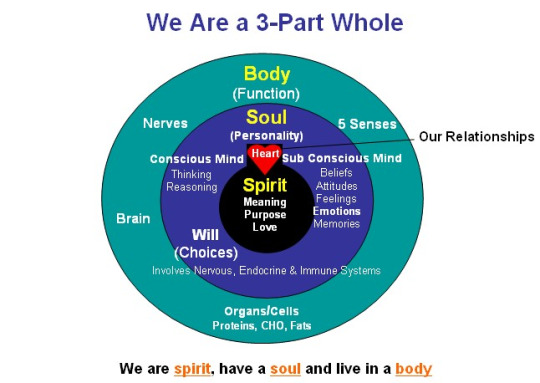
Three elements combine to create a life: a heart, a soul, and a body. But what of the soul and body left behind when the heart is lost? When the soul leaves the body, its vessel, life gives way to death, but what about when the heart leaves? A being does not perish when its heart leaves its body. The heart alone disappears into the darkness.
But first, in order to explain what I think happened to Isa, it’s important to get down to the basics. This chart is the most analogous I could find to the metaphysics of Kingdom Hearts. A complete person consists of three aspects that combine to make the true self. These aspects are Body, Soul, and Heart. When these three aspects are united, they connect the person to the Higher Self, henceforth referred to as Spirit.
Body: Pretty straightforward. These are the 5 senses. The biological “shell” we exist in to interact with the physical world.
Soul: “Soul” and “mind” are used interchangeably in KH. It’s basically our life force, as well as the “database” of accumulated lifetime experiences. Our memories, our thoughts, etc. All information is recorded here like on a hard drive.
Heart: The seat of our emotions that allow us to form interpersonal relationships. The Heart is absolutely vital because it acts as the bridge between the Spirit and the lower aspects of our being. If the Heart is compromised, it cuts someone off from their connection to their Spirit. If it breaks it also cuts them off from the Soul and Body.
Spirit: This term describes a person’s essence when they are connected with the Divine Source. This would be their true, fully conscious and aware, spiritual self. This is the complete self that is capable of making fully conscious decisions with love, meaning, and purpose.
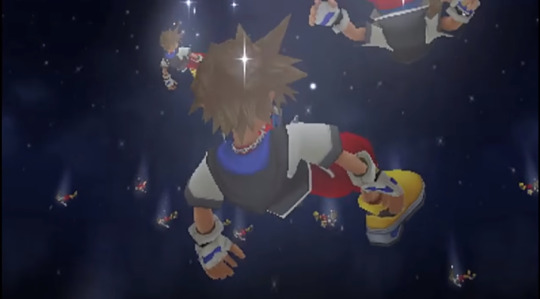
Kingdom Hearts mythology borrows heavily from ancient shamanism. There is a term called “soul fragmentation”. Minor fragmentation can disrupt soul energy and cause someone to not feel fully alive and engaged in life, develop chronic depression, addiction, etc. However the most severe form occurs when a living being is tormented into feeling extreme pain or suffering, especially when the trauma is repeated and they are never given the ability to heal. When the person reaches their breaking point and they cannot take the pain anymore, they will disassociate from their body and reality in order to get relief, and the soul will fracture into pieces. The ego that has been hurt or traumatized literally splits off and hides itself away. The most extreme type of soul fragmentation is where the soul leaves the body entirely and is caught between realities. Not dead, but pending in the astral realms.
It’s a natural and healthy survival mechanism that protects your soul from being annihilated, and shields the individual from the pain of severe trauma. But it also hinders the being from experiencing completeness. Since soul fragmentation is a natural coping mechanism, most of the time it is not severe and the fragments return on their own once things settle down. But this is not always the case. When the trauma has been particularly severe, repetitive and accompanied with extreme feelings of vulnerability and zero safety, the fragments do not return to the body. They refuse to return for fear of repeated trauma. Fragmentation may continue even after the consciousness has transitioned from the body.

Xehanort: Your body submits, your heart succumbs—so why does your mind resist?
Unfortunately, when the soul becomes fragmented it also makes possession by a low-vibrational spirit possible at the moment of dissociation. This is because nature abhors a vacuum, and will try to fill the void with something to be complete. When someone is not self-aware, they become susceptible to dark forces that can overpower their consent. A negative entity can keep the fractured pieces trapped in time, enabling full control of the possessed person.
This was what the Lingering Sentiment (also called the Lingering Will) was. A disembodied soul fragment of Terra that had taken up refuge in his suit of armor. The residual thoughts and sentiments that Terra had at the moment of his possession. Unable to move on, it remains trapped in that moment of trauma. It has a will of its own, but it’s not a truly conscious being in the way that complete humans are.Soul fragments are similar to a ghosts or poltergeists.
What it comes down to is this: if you can control the thoughts of the mind, you can control the soul, and you will then have control of the physical body. This is what Xehanort was attempting to accomplish with his mind control experiments. He wanted to fracture a person’s soul in order to make them a vessel. Fracturing the heart doesn’t work, because that results in the total breakdown of everything, including the body, which is the only thing Xehanort actually wants.
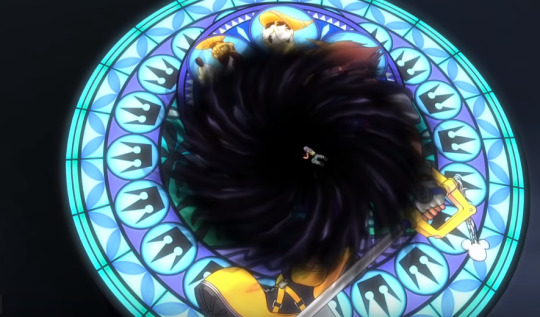
Mickey: You want him to dive back into Sora’s sleep? But Master, Sora’s heart is down in the darkest abyss. If Riku’s not careful, he might just get trapped down there with him. No… I’ll go instead.
The more fragmented the being, the more disconnected and less evolved the consciousness gradually becomes. If it is not healed and remains that way for long enough, it enters a danger zone; it continually sinks into the lowest dimensions of reality, where the personal shadow of the individual’s psyche and the collective unconscious start to flow together and merge.
Where this merge with the collective unconscious occurs, dark shadow beings start to emerge and multiply. In other words, the soul enters the the demonic realm, or the Underworld. This is no doubt what inspired the idea of the beach in the Realm of Darkness and even the Pureblood Heartless. The beach represents the meeting point between individual’s shadow self and the shadows of the collective unconscious; the darkness inherent in all people.
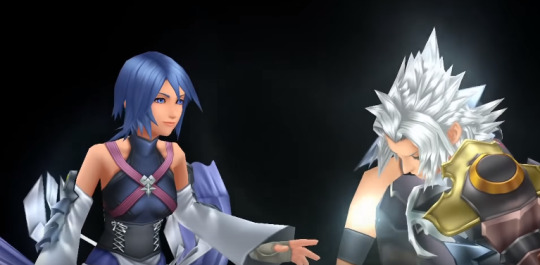
Yen Sid: The “Sleeping Keyholes,” are harder to reach. You’ll recall, in your first journey, that you brought many worlds back from the darkness–but some never returned completely. They still sleep, cut off from all outside channels. Not even the Heartless can enter.
If the soul is still not healed, it goes even deeper than the Underworld. In KH terms, that would be the Realm of Sleep. It becomes totally unaware of what is happening in the “surface” world as it escapes to a place of total darkness and safety with no conscious awareness whatsoever, just like going to sleep. In physical reality, it results in a sleepwalking, amnesiac or trance-like state of consciousness.
So if they stuck with the mind control plot, how would that affect Isa’s true consciousness? Basically, he would be in the same boat Sora would have been in if Riku didn’t dive into his heart to save him. Same with Terra if Aqua didn’t jump in after him. He’d sink down into the deepest, darkest abyss. Would Isa be conscious of what’s going on with his possessed self? Well, the spirit is only consciously aware of the contents of the soul when it is actually connected to the soul. When the spirit is disconnected from the soul, it becomes unconscious of the soul’s “database” of accumulated experiences. So, I would say no. He’d have no actual awareness of what his Nobody is doing.
But what about Saix then? What would that make him? And what about Isa’s heart? Well, basically I believe “Subject X” was nothing but a badly plagiarized version of Isa’s original backstory. So here’s what I’ll do: I’m going to use Nomura’s interviews and the Secret Reports to tell a story, and I’m going to edit the Reports from KH3 to more accurately reflect what I think was originally going to happen. This is my speculation on what the story would have been like if BBV2 never got cancelled.
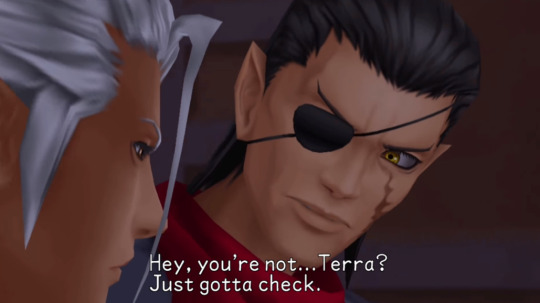
Nomura: Master Xehanort commandeered Terra’s body, and became Ansem the Wise’s apprentice. According to Secret Ansem Report 1 From KHII, the young man asked to become a test subject for Ansem’s research so he could get his memories back. After that they began the study of darkness, but did he really lose his memories? And are those memories Terra’s or Master Xehanort’s?
At what point were Ansem and Xemnas separated from Xehanort? When did they lose their memories?Nomura: Sometime between Birth by Sleep and Kingdom Hearts I. It happened during the events in the Ansem Reports from Kingdom Hearts I. Was it really memory loss? In the Birth by Sleep Secret Movie, Braig doubted it
When Terranort first becomes an apprentice, he seems really uncomfortable around Braig, suggesting that Terra is actually the one in control at first. Nomura also suggests as much. He probably does have amnesia, and it’s just his subconscious reacting to Braig. But Terra’s presence definitely seems to be the dominant one, at least at first. This is no doubt thanks to Aqua saving him from the abyss and Eraqus’ influence on his heart.
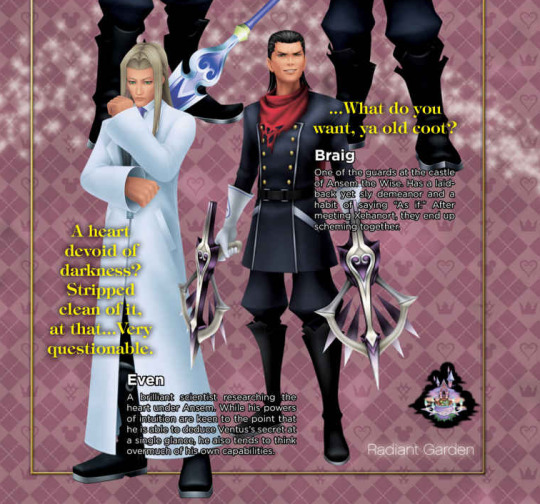
Secret Ansem’s Report 1
If I explore Xehanort’s heart by means of psychological tests, I may be able to awaken the past locked away within. My apprentice Even, too, has shown great interest in Xehanort’s memories. But is he really the right subject? Xehanort does indeed exhibit extraordinary talents…Too extraordinary…Perhaps they are even superhuman.
Even is very intuitive. He could sense that Ventus had no darkness in him at a glance. I think he could also sense darkness, and he took a special interest in Terranort because of this. I don’t think he trusted him. Anyway, Ansem conducts the initial experiment and successfully restores some of Terranort’s memory. Memories of Terra’s old life start coming back, but not fully. He’s desperate to know who he really is, so Ansem agrees to continue the experiments.
Secret Ansem’s Report 2
I have made a grave mistake. My study of the “darkness of the heart” began with a simple psychological test and quickly snowballed. Spurred on by my youngest apprentice, Ienzo, I constructed a massive laboratory in the basement of my castle. Unbeknownst to me, my six apprentices then began collecting a large number of subjects on which to perform dangerous experiments into the “darkness of the heart.”
From Ansem’s point of view, the experiments seemed to be having favorable results, and he even decides to build a huge laboratory in the castle’s basement. Ienzo spurred this on, but since Ienzo was just a child, he was no doubt told to suggest this idea to Ansem. Probably by Braig.
Ansem’s Report 7
I am studying material from the meteors that rained down that fateful night. What a find! The material is foreign to our world. It is elastic to the touch, and when two pieces are combined, they bond easily. None of the records even mention such a substance.
Was it introduced to this world when I opened the door? I wonder how many other such materials drift through the atmosphere of this tiny world… I wish I could soar off and find out! Could there be uncharted worlds up there? My curiosity never ceases to grow. But I should stop speaking of such unrealistic dreams. For now, there is no way to venture outside this world. My people and I are all but prisoners of this tiny place.
After repeated experiments, Ansem probes the depths of Terranort’s heart. But in addition to Terra’s memories, the experiments also restore his memories as Xehanort. Terranort remembers being a Keyblade wielder and his plan to create the X-blade. He regains his ability to use Master Xehanort’s Keyblade and opens Radiant Garden’s Keyhole.
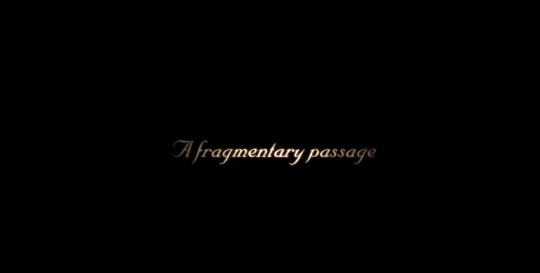
Nomura: While studying darkness the young Xehanort opened the door to the heart of Radiant Garden. This would have been possible if he had a Keyblade, but according to the Ansem Reports 4-8 in KH, he did not yet know about the Keyblade at the time.
Since Xehanort is possessing Terra, he also regains a lot of Terra’s fragmented memories along with his own, and they become intertwined. This creates a very mixed-up sense of identity, similar to someone with multiple personality disorder. They have “alters” that are totally compartmentalized, completely unaware of the other’s existence. Terranort constantly flip-flops between alters; sometimes, he can use the Keyblade, and other times he doesn’t even know it exists. The title for Birth By Sleep Volume 2 was supposed to be 0.5 A Fragmentary Passage. It seemed like it would totally revolve around this concept of soul fragmentation, and its style of story-telling would reflect that. It was supposed to be “bits and pieces of something whole” and tell the untold stories of many characters across the entire timeline. It’s probably why the producer went “…what?” when Nomura told him about the idea.
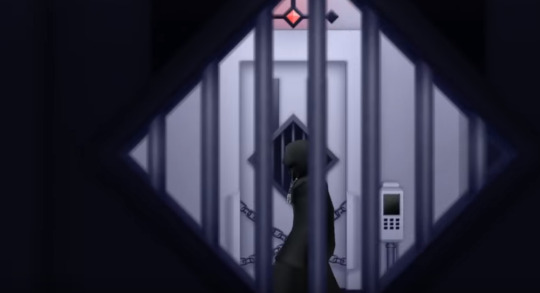
Although Terranort flip-flops between alters, Braig can see that the memory experiments worked, and the Xehanort alter remembers their original agreement. So, they decide now is the time to create vessels. Braig acts as Xehanort’s handler during the times he goes back to his Terra alter and they begin the experiments.
Ansem’s Report 2
It is my duty to expose what this darkness really is. I shall conduct the following experiments:
Extract the darkness from a person’s heart.
Cultivate darkness in a pure heart.
Both suppress and amplify the darkness within.
The experiments caused the test subject’s heart to collapse, including those of the most stalwart. How fragile our hearts are! My treatment produced no signs of recovery. I confined those who had completely lost their hearts beneath the castle.
But the experiments are not working. All the subjects experience the collapse of their hearts, making them useless as vessels.
Ansem’s Report 11
If the princesses and the Keyblade are connected, they should resonate.I’ve chosen a girl. I don’t know if she holds the princesses’ powers, but I will find out. She may lead me to the key bearer.
Sometime before Mickey’s visit from his flashback in KH2, Kairi is abducted by the apprentices and is experimented on.
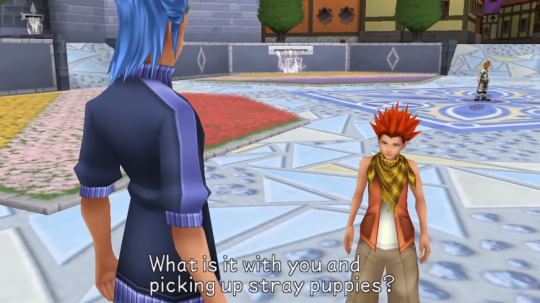
Memoirs
On the day we finally secured our entry, we descended the long spiral stair at the heart of the castle to find a dark space below it, lined with cages. There wasn’t light enough to see if they were inhabited, and we were in no position to call out to any occupants within. Yet we could feel it. A definite presence, there in the black. Terror washed over us, and we immediately regretted coming. But just as we turned to flee, we heard the faintest of voices. The urge to run was nigh overpowering, but someone or something beckoned us on. There, framed by a tenuous sliver of light, we found her. It was too dim to make out her features. We spoke to her in hushed whispers. Who was she? Why was she imprisoned here? She had no answers for us. Had no memories at all. She was an enigma, but I knew I wanted to help her. Lea was determined to free her, too. We slipped deeper into the castle that day knowing only that we wanted, with all our hearts, to save her.
Isa and Lea also come to the castle for their own personal reason. But at some point they become aware of Kairi’s situation and try to help her. I think the “stray puppy” scene was actually foreshadowing. I think Kairi was going to be another “stray puppy” that Lea would want to help.
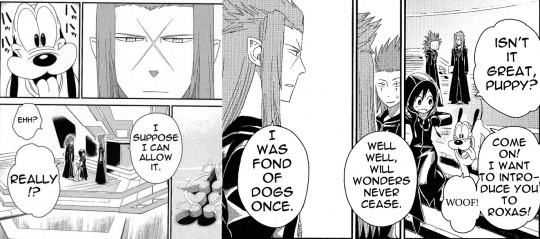
Since Isa is basically a male tsundere, he may scold Lea for it, but he likes puppies just as much as Lea does. Even the manga jokingly references Isa’s love of dogs. One of Isa’s weapons in 358/2 Days is named after a lunar goddess who is often depicted with a hunting dog as a companion and she was considered the patron and protector of young girl children. So given their personalities, they both attempt a rescue of Kairi. They are unsuccessful and the apprentices catch them.
Xemnas: “As your flesh bears the sigil, so your name shall be known as that…of a recusant.”
Isa, as a Moon personality archetype, has a large capacity for darkness. Even can sense this. So Braig and Terranort take a particular interest in him and dub him “Subject X” for being the most promising prospective vessel for the X-blade. He becomes Xehanort’s favorite lab rat. They do horrible things to him, including carving the Recusant’s Sigil onto his flesh.
Lea doesn’t go through anything nearly as horrific, because as a Sun personality archetype, his potential for darkness is not as great as Isa’s. Plus, there’s a better use for him. He is a good source of trauma for Isa. If the apprentices threaten to torture Lea instead, they can greatly increase Isa’s mental anguish and also get him to submit more easily. He’ll let himself get tortured to protect Lea. Isa’s Mystery Gear weapon (the one that’s supposed to bring out the wielder’s true personality) is actually a reference to a myth about a rabbit who is so selfless, he offers himself as food to a hungry beggar because he has no other food. So I think this is a fitting story line for his personality. Isa endures as much as he can possibly handle until he reaches his limit. He dissociates, his soul fragments…but his heart doesn’t break. Everyone realizes what a special subject he really is.
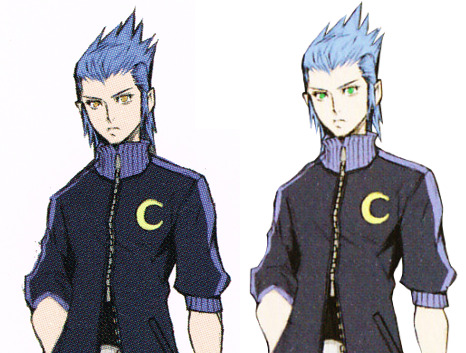
Isa is now an amnesiac in a trance-like state, leaving his body wide open for possession. Terranort successfully implants a piece of his heart into him. Isa gets Xehanort’d, and gets gold eyes and pointy ears. Weirdly, his BbS concept art shows a young Isa with gold eyes, along with his normal version with green eyes. Was there going to be a scene in BBS showing him get Xehanort’d? Was this reference art for BbS Volume 2? Who knows. But from here, I will refer to him as “Isanort”.
Secret Ansem’s Report 2
As soon as I found out, I called my apprentices together and ordered them not only to cease their studies, but to destroy the results of their research thus far. What on earth was happening within the hearts of my six beloved apprentices? While pursuing the mystery of the darkness of the heart, could they themselves have strayed into its depths? Yet I remain the most foolish of all, for having begun these experiments. We are not meant to interfere in the depths of another’s heart, no matter what our reasons for doing so…And my error plunged me into despair.
Experiments of the Heart – Notes on Subject X, Excerpt 2
Subject’s memories have not returned, and our conversations remain less than lucid. My pilot studies used a handful of subjects, but none possessed the fortitude to endure them. Ultimately, all suffered the collapse of their hearts. I knew it would be a heavy blow to lose a subject as unique as him. Upon discovering the tests I’ve been conducting, my master demanded that I cease my work immediately and destroy what research I have compiled. Worse still, he ordered the release of my remaining subjects. He is gone. Where is Subject X now? Has “wise” Master Ansem hidden him away? Whatever the case, I will not be deterred. I will get back the first successful subject of my grand experiment. —Xehanort
Anyway, Ansem the Wise discovers what Terranort and the other apprentices have been doing and he is horrified. He demands they destroy their research and release all the subjects immediately. He falls into despair for having begun these experiments in the first place and blames himself. Mickey arrives and consoles him. From the novels, we know that the apprentices kept Kairi sleeping in a pod even after Ansem ordered the release of the subjects; I would wager they kept Lea as well. He’s Subject X’s friend. But Ansem the Wise does get a hold of Isanort and takes him away. Terranort wants him back, though.
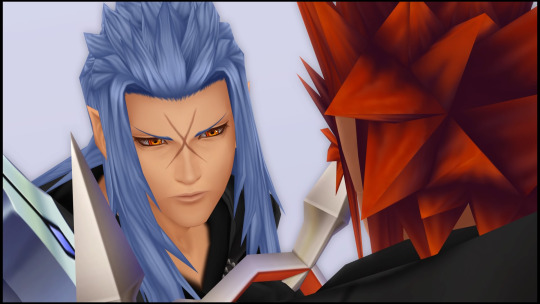
Experiments of the Heart – Notes on Subject X, Excerpt 1
Subject was found in the castle basement shortly after dawn. Male, approximately fifteen years old. After seven days’ observation, he spoke his first words, but could not provide a name. Subject exhibits signs of profound amnesia and displays concern for where his friend is. His words suggest that he arrived with another, though he cannot recall the name of his erstwhile companion. All efforts to explore those memories have met with a rejection response.
After my initial experiments on my apprentice, I ceased my research into the heart, my hand stayed by some profound fear I could not fathom. My fears proved to be well-founded. And now this subject is just like my apprentice was when I first discovered him: devoid of memories. The fault is mine for having begun this research. And yet this subject is someone who could actually benefit from my original work. My apprentice, Xehanort, had begun to reclaim his lost past thanks to these very experiments: by traversing the heart, we have a direct path into memory. If my research can help him regain his memory, perhaps I can atone for the mistakes I have made. Who is he? This is a question I cannot ignore. I must ascertain his identity.—Ansem
It’s funny to me because I honestly don’t even have to change the Reports that much to make them fit Isa’s situation perfectly. It’s really too easy. Like, they’re just too good of a fit to be a coincidence. Anyway, Ansem takes Isanort away and tries to figure out who he is. Because Lea is gone, no one can identify him and Ansem has no idea what to do with a mysterious teenager with profound amnesia. He feels it is his duty to help him regain his memories, and reluctantly performs experiments on his heart.
Recollections
Am I alive? I awoke in a cell, alone until the researcher came and asked me countless questions to uncover my identity. I had no answer to offer him. A friend…that is the sum total of my memory. I could not even recall my name. I was simply called “X” there. I found no solace during the time I spent in that dark and lonely cell. One day, a man came to take me from the prison. I could not see him for the darkness, save that he wore an eyepatch. Even now, I feel no closer to understanding who I am. —Unknown
This is how Isanort would be after Ansem takes him into his custody and he helps him become coherent enough to talk. He has Xehanort’s heart fragment in him, and his soul was fractured, so his memory is a total mess. A person’s heart getting swallowed by Xehanort’s is a gradual process, so he’s still not fully Xehanort yet. His heart still remembers certain things. He remembers a friend, that he was called “X”, and that a man with an eyepatch took him from the prison cell to somewhere else (probably when he was going to be tortured). And his memory cuts off there. It’s too traumatic; these memories stay blocked out and relegated to his subconscious.
“The mind forgets, but the heart will always remember. And what is the heart’s memory but love itself?” ― Twan Eng Tan, The Gift of Rain
During the experiments, Ansem connects with the depths of Isanort’s heart, bringing back his lost past. Since Terra and Isa were both fragmented previously, a piece of Ansem gets left behind inside of their hearts, affecting their eye color. This is how Saix gets orange eyes, not the gold ones the other vessels have. Since the heart is the bridge, Ansem can restore the “databank” of information, even though the real Isa is still lost in the Realm of Sleep. Even when Isa’s heart gets completely consumed, the soul data will remain. So this alter ego of Xehanort will now gain access to the collective sum of Isa’s memories, thoughts, experiences and emotions. He will believe he is Isa—the real Isa. He has no other memories to give him any other identity. But of course, he’s really not.
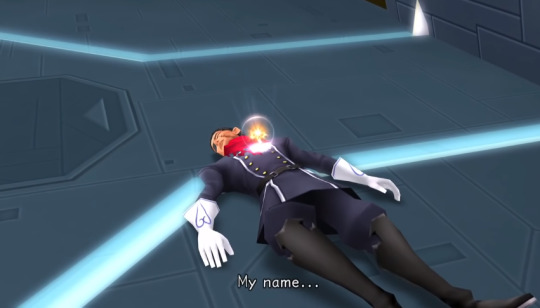
Sometime later, Isanort is stolen back from Ansem the Wise, who gets banished to the Realm of Darkness. But then something goes wrong. Terranort is struggling badly with his split personality, as well as Ansem the Wise’s influence on his heart. He starts thinking he’s actually Ansem and he turns on everyone, steals their hearts, then becomes a Heartless himself. He becomes Ansem Seeker of Darkness, who also has orange eyes. Everyone becomes a Nobody at this point. Saix is created as the Nobody of Isanort, similar to Xemnas being the Nobody of Terranort. He’s STILL another self of Xehanort. But thanks to Ansem the Wise’s experiment, Saix retains all of Isa’s memories. So he doesn’t seem any different from the other Nobodies who never lost their memory.
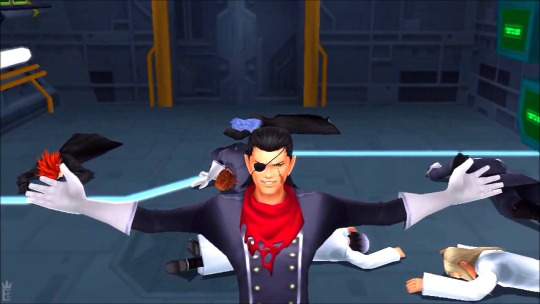
Lea has no reason to think his friend’s situation is any different from his. They were both wearing black cloaks then they became Nobodies. They were both experimented on and are both victims, though Axel wasn’t hurt as badly. He’s still mostly the same person afterwards. Nobodies lose their heart, but what makes them unique is that their soul and body remain due to their strong will. He has no clue what really happened to his friend, though. And despite being another Xehanort, Saix actually thinks he’s Isa and he genuinely wants to overthrow Xemnas with Lea. They make these plans together and work cooperatively. Saix doesn’t trust Xemnas and wants to figure out his secrets. And Lea feels the same, plus he wants to support his friend. Xemnas really likes Saix for some reason, so they work together to get Saix to the top of the hierarchy.
Nomura: It is a fact that Saix and Axel probably wanted to take over the Organization, however they didn’t understand what they were going to do or how to do it. As for Xemnas, he knew about this betrayal, but never brought it up. Generally, one’s conduct was for the sake of their purpose.
Xemnas knows ALL about their plans to overthrow the Organization, but he doesn’t try to get rid of them like he did with Marluxia or Larxene. Why? Nomura says that they were serving their purpose. With Lea, it’s probably because he’s very useful. He follows orders, eliminates traitors and since Xemnas knows where his loyalty stands, he can predict his behavior.
Xemnas: But weakness has the power to awaken that which is dormant. It is clear that through his actions, however foolish they may have been, Axel has touched Sora’s heart. Perhaps HE will soon awaken.
Axel was very useful to Xemnas in 358/2 Days. Riku wound up in Castle Oblivion because he “resonated” with Sora. And Axel grew closer and closer to Roxas during Days. I think that’s why they kept sending him back to Castle Oblivion. Xemnas thought that Axel might “resonate” with Ventus, allowing him to find the Chamber of Waking. It didn’t work, though, because Ventus’ heart was said to be inside of Roxas.
I just did what I thought was the best thing at the time. For Roxas, for Xion, for the Organization—and for Isa. But most of all for me.
This is from the novel. It’s Axel’s inner monologue after Roxas gets angry at him for attacking Xion. He’s STILL loyal to his friend, even though his friend is no longer even there anymore. I think this is why Axel was never considered a traitor. He’s technically still loyal to Xehanort, even if he doesn’t realize it.

Xemnas: The poor fool. How long will he keep chasing the illusion of friendship, when he himself lacks emotion? Trying so hard to retrieve what he has lost, when it may never have existed in the first place. He deserves nothing more than our pity.
I think Xemnas’ quote in KH2FM+ was even more about Axel’s relationship with Saix than it was about his relationship with Roxas. Xemnas’ face was shrouded as he just stared at Saix. It seemed like the same visual cue they used when Xigbar was asking about the Chamber of Repose and the Chamber of Waking. It felt like a hint that there’s more to be revealed on this subject that is still shrouded in mystery. Axel’s friendship with Saix never existed in the first place. It was all an illusion. Xemnas knew. It really shows how he was able to use Axel’s desire for friendship to manipulate him.
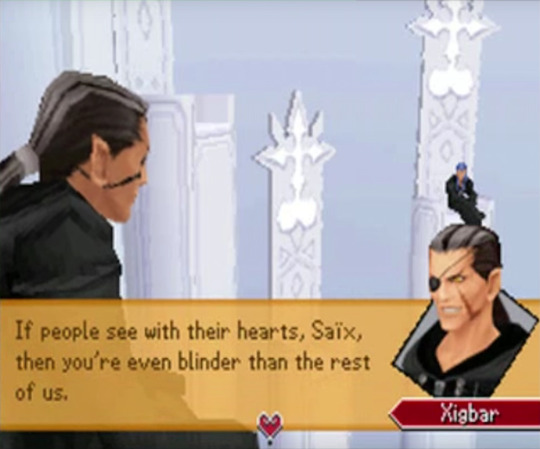
Poppet…? Apparently he meant Xion. But what resemblance was he referring to? Xion was just as much a puppet as ever. Saix had no time for these deliberately oblique remarks from Xigbar.
“Nonsense. I see no problem whatsoever.”
Xigbar only laughed louder. “Pa-ha-ha!” No, apparently you don’t!”
“Something you find amusing?”
“Oh the things you hear from a guy with no heart,” Xigbar said through his hilarity.
As for Saix, Xemnas was probably just amused because he is not actually a threat to him. They’re the same person, even if Saix is none the wiser. This conversation is from the novel, but it also happens in the game, as well as the movie. Saix clearly has no idea he has been Xehanort’d. Braig does know, and he finds it hilarious.
“Don’t let us down now, kiddo. Shouldn’t be too much trouble without a heart,” Xigbar told Saix.
Then there’s this scene later on, also from the novel. It’s when Xemnas decides to eliminate either Roxas or Xion, and orders the memory devices to be placed. Xigbar calls Saix “kiddo”. I think Braig played a huge role in the human experiments and Isa’s condition. Seeing Saix act so clueless made him remember experimenting on teenage Isa and he nostalgically calls him “kiddo”.
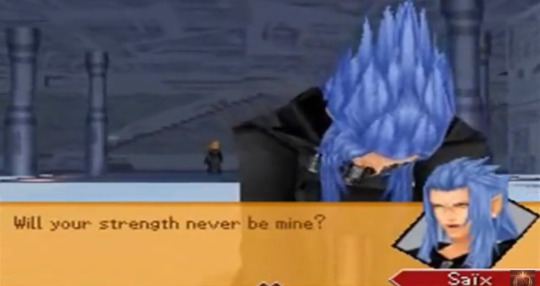
“I’ll bring him back to our side. Let me—”
“That’s enough.” Saix turned his head, giving Axel a sidelong look over his shoulder. “Traitor.”
Axel scowled darkly.
“I’m going. You know, don’t you, that you won’t stop me except by force? And even if you tried, you would fail.” Saix went on his way. Memories informed him that he hated this kind of thing.
There are other scenes from the novels that are phrased in a manner that made me feel Saix is simply Xehanort who has Isa’s memories. Right after Roxas leaves the Organization, it talks about how his “memories informed him” that having conflict with Axel and fighting was something he hated. It’s just phrased in a way that makes his memories sound so…foreign to him. Like they’re so at odds with his current personality that even he doesn’t understand them.
Saix blocked the sweep of the Keyblade. It brought back those long-ago days when there had been some pleasure in fighting. The Claymore slammed into Roxas…And he recalled things from long, long ago.
This is while he fights Roxas. What exactly is he remembering? It sounds like he’s remembering Isa’s past. What pleasure did Isa get while fighting? That’s definitely not something we ever got to learn in KH3.
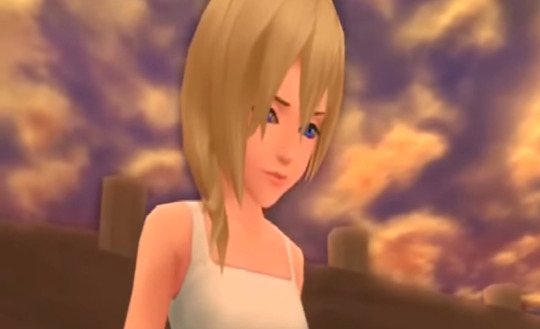
So why can’t Saix just regrow a heart like everyone else? Nature dislikes a void and seeks to fill it as soon as possible. Well, I think Saix does have a Heart…sort of. He shares a heart with Xemnas and Xehanort. The jokes Xigbar makes about him having no heart are a reference to Isa’s heart.
This is a scene from the KH2 novel that isn’t in the game. It happens after Kairi is kidnapped by Axel, and Saix faces off with Riku in Twilight Town. Namine is with him.
“You have no part in this!” Saix slapped her across the face, hard enough to throw her to the ground.
“I feel bad for you, too,” she told him.
“What are you talking about?” Saix towered over Namine.
“You haven’t even noticed yet…that you have a heart.”
Several Nobodies emerged from a rift out of the corridors.
“A heart? I have a heart? No one wants your nonsense!”
Saix raised his sword over Namine—but Riku was there with Soul Eater to intercept the blow.
“Hmph. I don’t have time for these games.” Darkness welled up from a rift behind Saix. “Run along and help your dear hero.”
With that, he disappeared.
“Are you all right?” Riku helped Namine to her feet.
“Now I understand…,” she murmured.
“Namine…? You understand what?”
She was silent for a moment and quietly shook her head as she stood. “It’s nothing. We have to find Kairi.”
Namine realized something important about Saix, but she had no time tell Riku about it. I think she realized at that moment that Saix’s true heart is actually captured by Xehanort. So, where exactly is Isa’s heart, then?
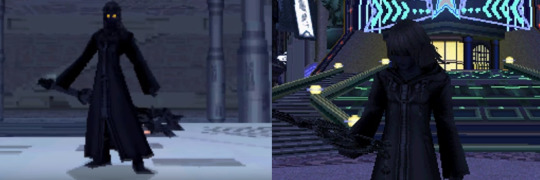
And he had some kind of power—something that gave her that weird feeling when she fought him. Like a Saix aura. Who was he?
That’s what Xion says in the novel after she fights Riku. She says he gives off a “Saix aura”. Interesting choice of words. We know that Riku has Xehanort’s Heartless living inside of him, which is the cause of his dark aura. Why does Saix give off the same aura unless he’s different from the rest of the Organization in some way? In Days, there are a couple of optional boss fights that really stand out. Anti-Riku and Anti-Saix. The only Anti-form boss fights in the game.
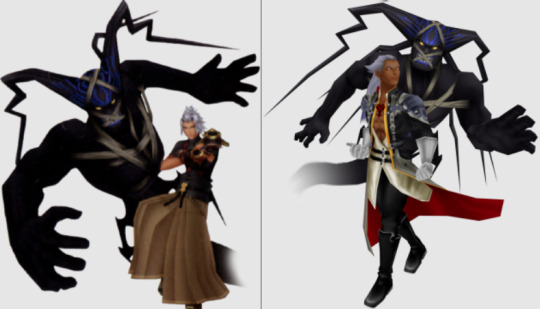
In “KHI” when Sora stabs the “Keyblade of people’s hearts” into himself to release his heart and Kairi’s, Sora’s Heartless and Nobody were born. When Master Xehanort and Terra:Xehanort stab themselves with the Keyblade, were his and Terra’s Nobodies not created?
Nomura: That is not yet clear. However I will say that the fixed sentiment that remained just after Master Xehanort stabbed himself with the Keyblade was not a Heartless.
If Isa’s heart has been swallowed by Xehanort’s heart, then he should be in a similar state to Terra, who became Xehanort’s Guardian. It mostly does his bidding, but it is capable of recognizing certain people that it had a strong emotional connection to. It clearly remembered Riku in DDD, and he recognized it as well. And it refuses to attack Aqua and Ven in KH3. Nomura said that it is not a Heartless.
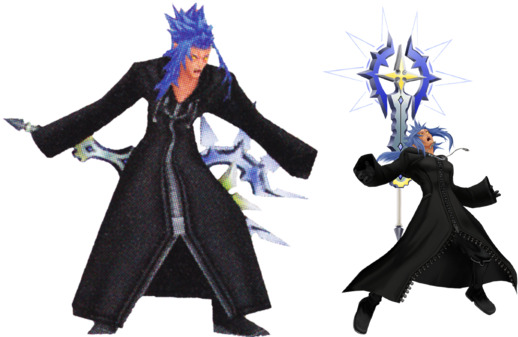
What happens to the hearts of those who have had Master Xehanort’s heart planted within them?Nomura: They’ll gradually be swallowed by it. As for Master Xehanort, he plans to control them completely. The planted parts of the heart are captured rather than disappear.
It’s Terra’s captured heart that’s being controlled by Xehanort. That’s what I think Saix’s Berserk state is. That’s what I think happened to Isa’s heart. The Berserk state is his repressed shadow self.
Second in command who longs for the heart he does not have. Only the moon breaks his icy calm.
Soul fragmentation plays a huge role in creating the shadow self. This is a part of the subconscious that is composed of repressed feelings, instincts, impulses, weaknesses, desires, and fears. The heart remembers even when the mind forgets. The Berserk state contains all of his rage and pain from the repressed memories of being experimented on and tortured. So it goes insane during the full moon, which brings the repressed memories of the subconscious to the surface. Because of this pure rage, it’s a very effective weapon.
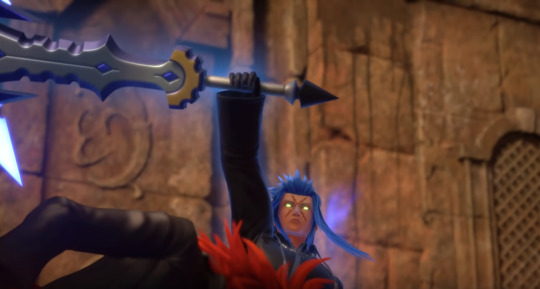
Saïx: Do you know what happens to those who lose their true purpose? Inevitably, they destroy themselves.
The Berserk form is used when Saix fights Lea at the Keyblade Graveyard. I noticed during the final battle that Lea doesn’t try too hard to fight Saix. He pleads with Isa to stop attacking and looks directly into his eyes. Berserk Saix raises his Claymore, but he stops and doesn’t attack Lea. Then Xemnas shows up. Of course, canon!Saix was fully in control of himself and was just pretending to be loyal to Xemnas (which makes no sense).
I think originally, that scene would have showed that Isa’s heart still remembered Lea even when his mind didn’t, and he didn’t want to hurt his best friend. Just like The Guardian wouldn’t attack Aqua and Ven. He promised his friends that he would set things right. Terra remembered his true purpose. Same with Saix. His heart would finally remember that friend whose name he couldn’t remember. So Xemnas has to step in and take over the fight.
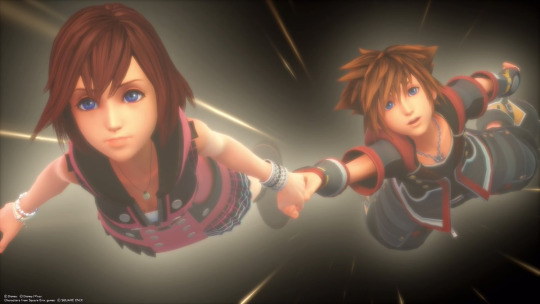
Young Xehanort: It’s for traversing hearts to reach worlds. Not for traversing worlds to reach hearts.
Lastly, there’s the issue of how to heal Isa and what his personality would be like after getting saved. There is a concept called “soul retrieval”. Soul retrieval is an ancient practice that shamans use in order to bring an individual who is suffering from soul fragmentation back to wholeness. The shamanic approach to healing this condition is to enter an altered state of consciousness and journey into the inner spirit world, retrieve the lost parts of the soul, and reintegrate them into the psyche of the afflicted person. This is where the whole concept of “birth by sleep” and “the power of waking” comes from.
The soul cannot return, in whole or part, if there is anything occupying that space. So it is not just about calling the soul back in, but also removing from the energy field all that is blocking the return of the soul parts. The inner spirit realms are often inaccessible and are guarded by heavy defenses that make it difficult or impossible for the fragmented person to go through on their own, without the guidance of a shaman.
Generally, it is not recommended for anyone other than experienced shamans to attempt a soul retrieval. It can be very dangerous even to experienced shamans. Only one who has gone through a shamanic death initiation can go to these realms without risking injury or even physical death. There are some scary parts of someone’s subconscious and the astral realm in general; parts that could be threatening, angry, violent, self-destructive, primal, and so forth. It’s probably why it’s considered something that only a Keyblade Master can do.
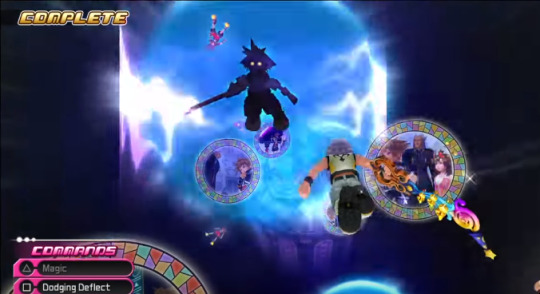
Mickey: There’s something real strong that binds us to each other. Even in the darkness, you can reach him. All you gotta do is follow that connection!
Soul fragments generally hold a lot of psychic pain and trauma. Realigning them is not an easy endeavor and requires assistance from those who are balanced and connected with the higher realms of light. Fragmented soul pieces may appear as shadow selves as well. When Riku dives into Sora’s heart, he sees anti-Soras as well as normal Soras.
In these soul retrieval journeys, harsh energies manifest in the form of archetypal images of monsters, demons and other dangerous beasts. These are the guardians of the soul, or in psychology they are known as defense mechanisms of the psyche. The shaman must overcome these in order to persuade the soul fragments to come back.
Once the lost fragments are located, the shaman communicates with them, in order to ascertain how or why it left. They will acknowledge the former pain and gently negotiate the soul’s return to the body. Each part is gathered and brought back through the “veil” between the worlds and gently reconnected into the person, by blowing into their heart.
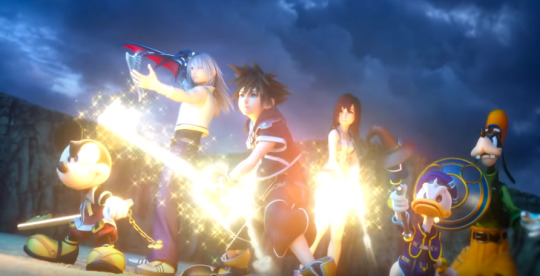
The soul cannot be forced back, though. It has to want to come back. The shaman can only persuade it. The soul pieces must process the original trauma that caused the splitting and find a way to overcome it. I think this is why the theme song for KH3 is “Face My Fears”. It’s all about confronting the darkness within and emerging stronger and more whole than ever before.
Soul retrieval brings back one’s consciousness, personal essence, life force and vitality. It is a major action that changes a person’s life. A soul retrieval is one of the most powerful forms of healing a person can experience. Upon the return of lost soul parts, people feel a sense of well being and wholeness, childlike joy, exuberance and vitality. They experience a dramatic shift in consciousness, a sense of personal power, and a new level of spirit to heart connection. Not only do I think Isa would be the same person he was before he fragmented and not influenced by Xehanort…I think he’d be more spiritually healthy than ever.
But someone would need to perform this soul retrieval on Isa. You need to be able to ease the person’s pain to convince them to come back to reality. For such severe fracturing, a deep heart connection with the person is mandatory. Anyone else would just wind up hurting him and fragmenting him even further. This is another danger of soul retrieval. The only one who could do it for Isa is Lea. But he’s not a Keyblade Master.

Nomura: Ansem’s research results will become the key to healing the “pain” in the future of the story.
Nomura: The data that Ansem has hidden within Sora is the secret to that revival. When Ansem had become DiZ, and studied the heart and emotions, the results he found he hid within Sora.
Nomura: You could say it’s the key. That data contains the details explaining the way to connect lost hearts.
Nomura: There are two possible meanings of the “key.” One of which is the ‘hardware’ key, which opens doors - this is what keys are in general, and the other is the ‘light’ key, that opens something else. In this case, it is currently unknown as to which type of key Sora must find. This is the main storyline of Kingdom Hearts III - Sora must go on an adventure to find the “key” without knowing what or where it is.
Although the ancients discouraged untrained people from performing soul retrieval, technically anyone can do it. Truly empathetic and unconditionally loving humans gain the spiritual power to recollect the consciousness fragments of traumatized people that are trapped in the astral realms. When someone practices unconditional love, it helps to integrate and heal the fragments, as well as neutralize any negative emotional energy in the environment. THIS is what I think Ansem’s research was originally all about. The “power of waking” exists in us all. Sora is looking for a key that is inside of him the whole time.
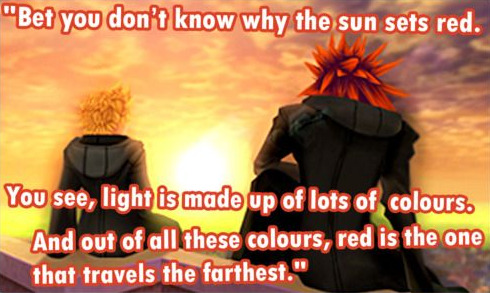
Go on, you just keep running. But I’ll always be there to bring you back!“
The Realm of Sleep exists in the deepest, darkest abyss. Only the farthest-reaching light could possibly penetrate darkness that deep.
#long ass post#kingdom hearts#kingdom hearts meta#kingdom hearts 3 meta#kh3 spoilers#anti-kh3#kh saix#kh isa#kh axel#kh lea
45 notes
·
View notes